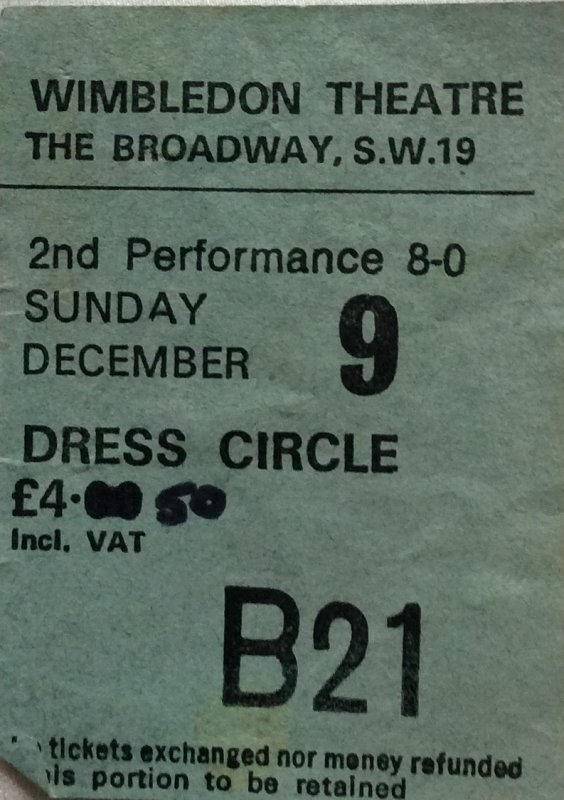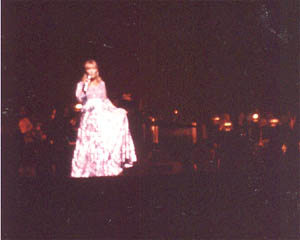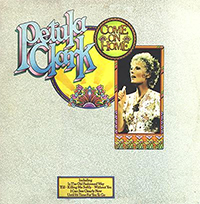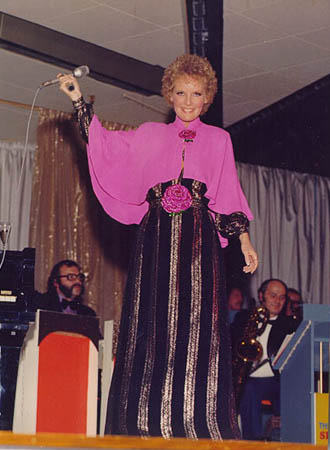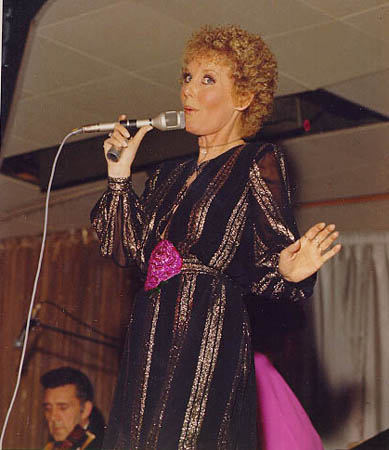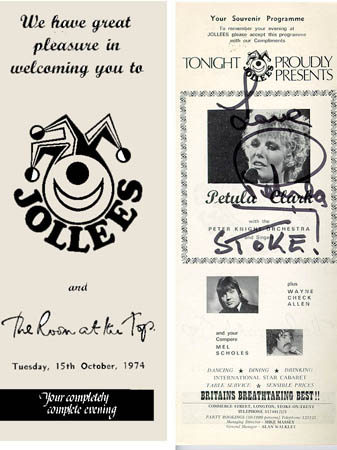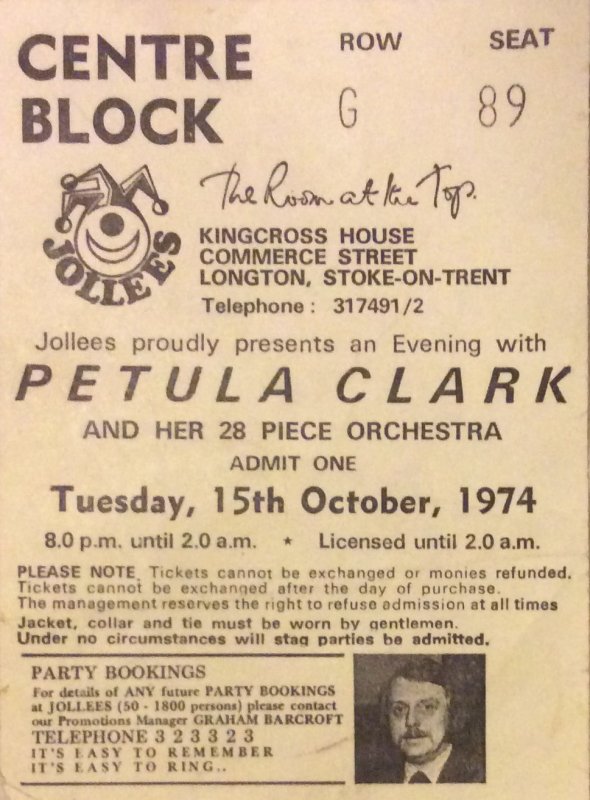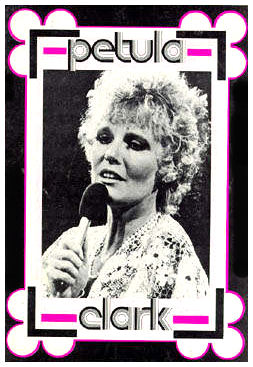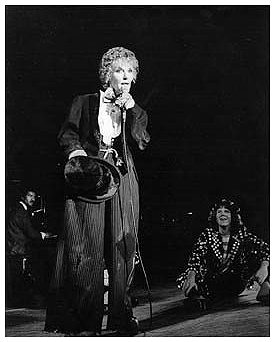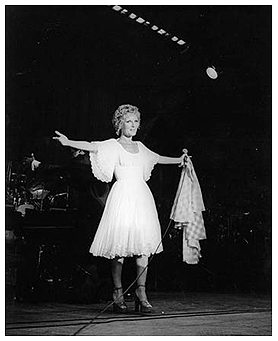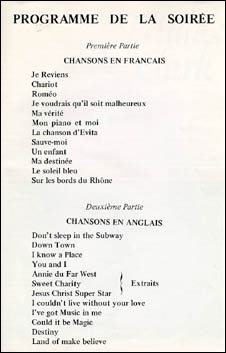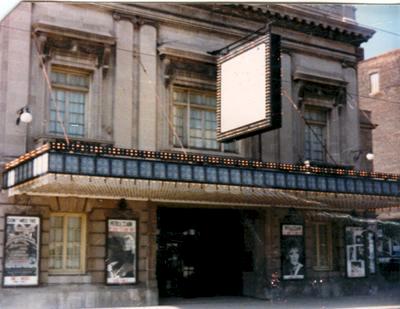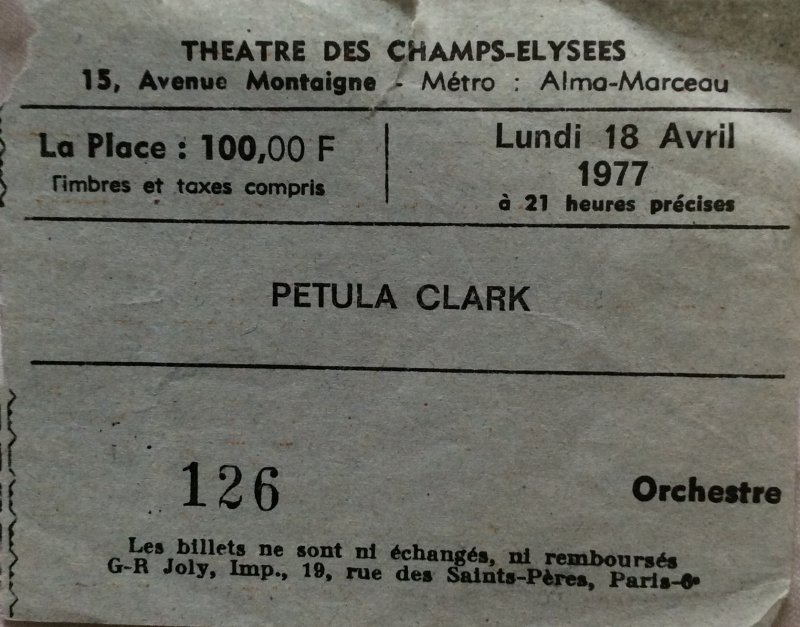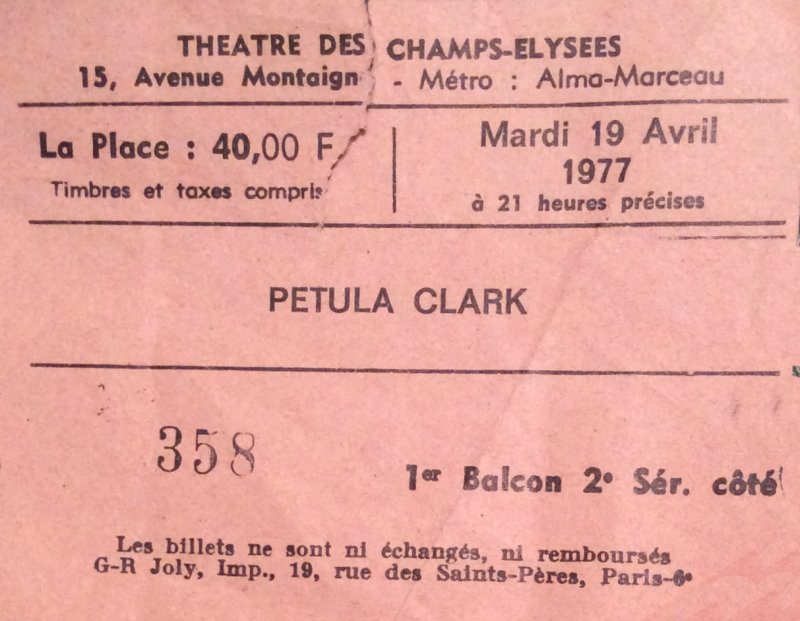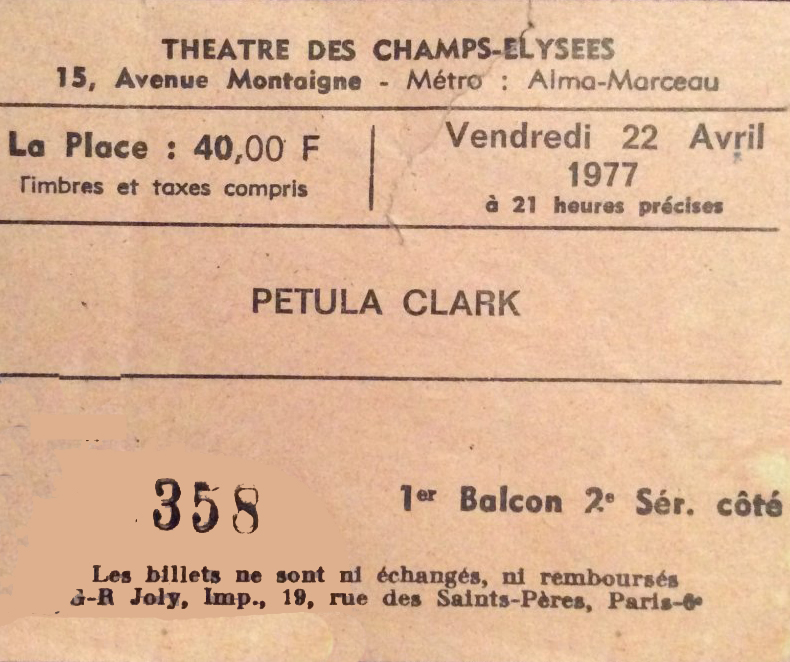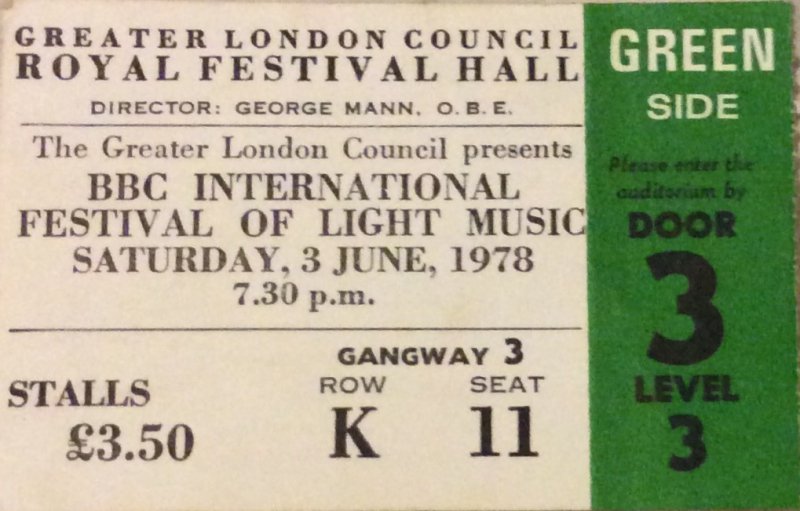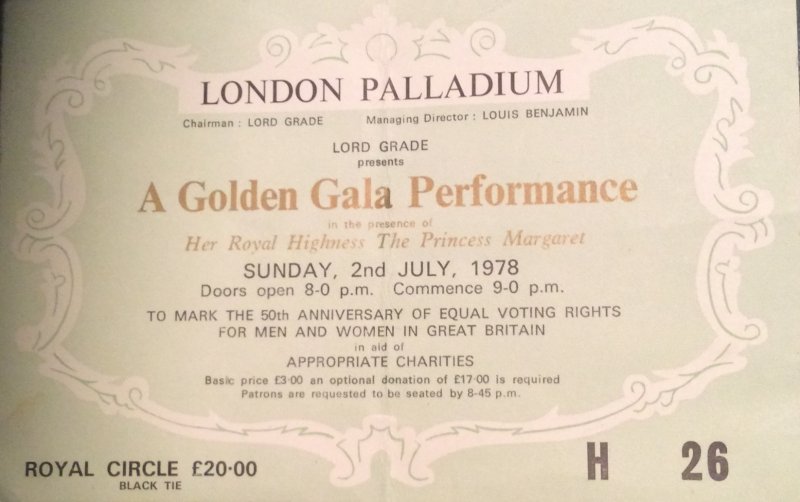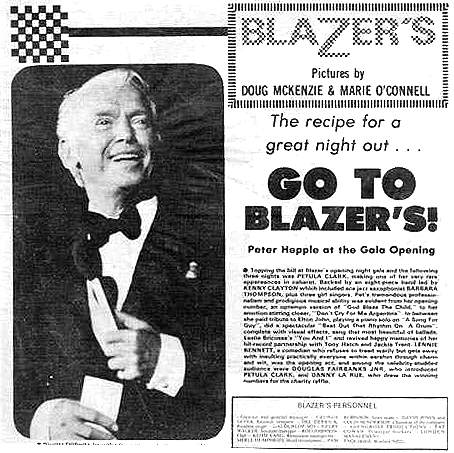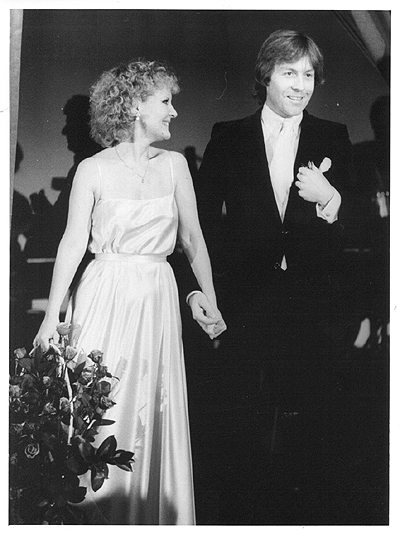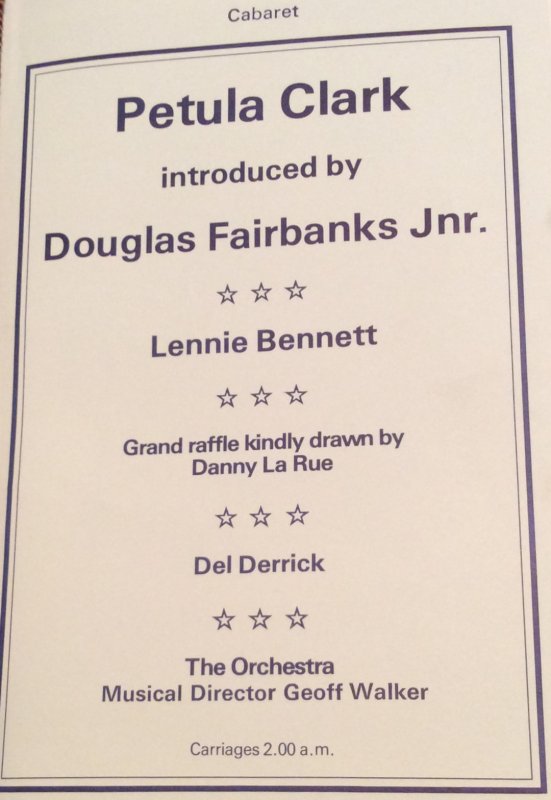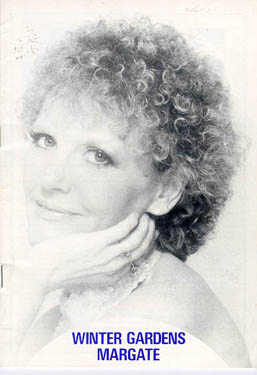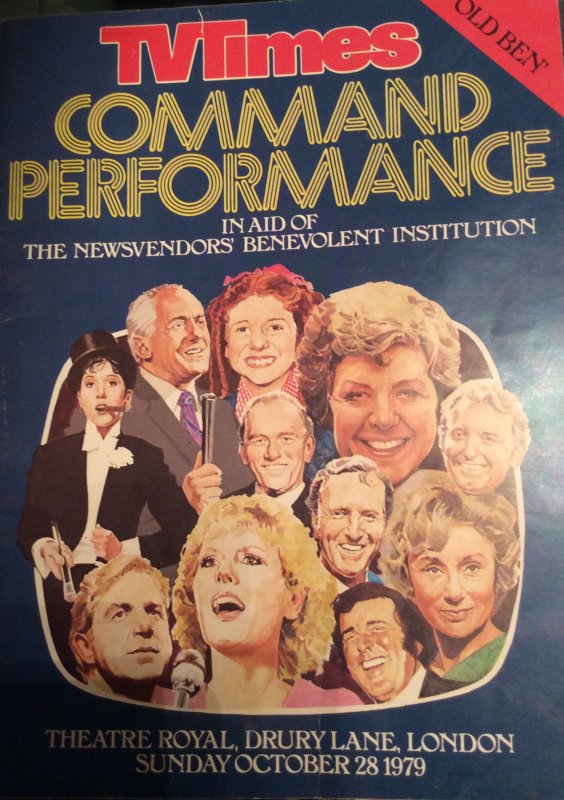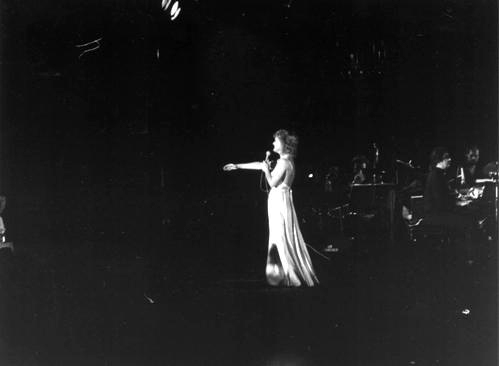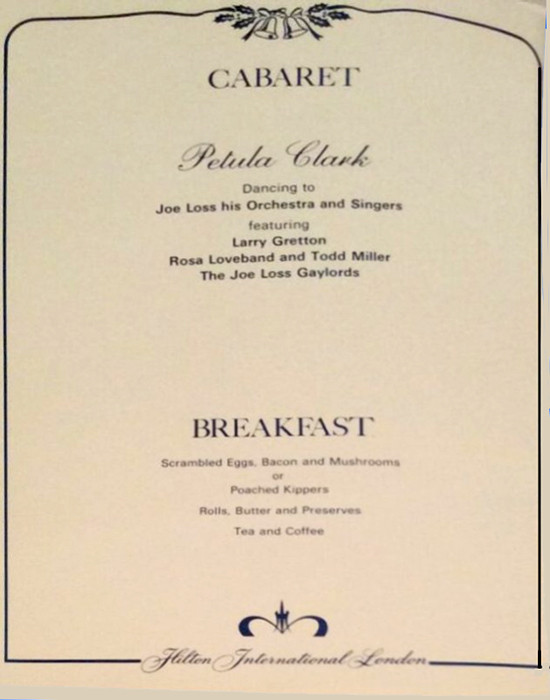LIVE - IN CONCERT
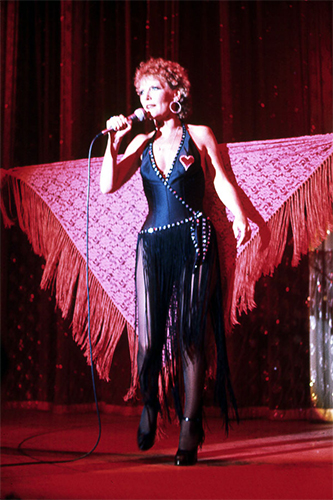
Photo courtesy of Linda Rice
THE SEVENTIES
1970
 January 22, 1970
January 22, 1970Petula Clark's Debut Is Warmly Received
Pert and perky Petula Clark made her Houston debut to a large house and warm reception Wednesday night in Jones Hall where she will appear again today for two performances. "You're wonderfully generous," she said, "but laying on this London weather is too much!" Even the weatherman made her feel at home.
Her accompaniment by the Buddy Rich band was a bit much, too extremely loud and brassy at times, a challenge the petite blonde met with aplomb. Ironically, one of her first numbers was "I know a place where the music is fine."
The dainty English singer is a doll, appearing even smaller than her five-foot-two (yes, with eyes of blue) and much younger than her thirty-plus years.
And she's quite a clown, too. A big production number, "My Name Is Petula," in which she changes her style to fit the German, Italian and French images of herself, is most endearing and comical. A delightful My Fair Lady medley also is performed with gentle humor.
More of her famous numbers were sprinkled throughout the show: "Don't Sleep in the Subway," "This Is My Song," "My Love." And the most famous, "Downtown," her first Grammy award winner, was saved for an encore.
She offered three Lennon-McCartney tunes quite dramatically, perhaps too much so for the tender "Yesterday," but very effectively for "Hey Jude." The other was "Fool on the Hill."
From her films she offered "How Are Things in Glocca Morra (Finian's Rainbow) and "You and I" (Goodbye Mr. Chips).
The Buddy Rich band opened the program with the leader on drums, a chore he relinquished - exhausted - for Miss Clark's performance. It was an earshattering experience. Would you believe a dozen horns? With piano and guitar hardly audible.
Rich's prowess on the tom-toms is remarkable, but long drum solos have a way of seeming much longer than they really are.
Pert and perky Petula Clark made her Houston debut to a large house and warm reception Wednesday night in Jones Hall where she will appear again today for two performances. "You're wonderfully generous," she said, "but laying on this London weather is too much!" Even the weatherman made her feel at home.
Her accompaniment by the Buddy Rich band was a bit much, too extremely loud and brassy at times, a challenge the petite blonde met with aplomb. Ironically, one of her first numbers was "I know a place where the music is fine."
The dainty English singer is a doll, appearing even smaller than her five-foot-two (yes, with eyes of blue) and much younger than her thirty-plus years.
And she's quite a clown, too. A big production number, "My Name Is Petula," in which she changes her style to fit the German, Italian and French images of herself, is most endearing and comical. A delightful My Fair Lady medley also is performed with gentle humor.
More of her famous numbers were sprinkled throughout the show: "Don't Sleep in the Subway," "This Is My Song," "My Love." And the most famous, "Downtown," her first Grammy award winner, was saved for an encore.
She offered three Lennon-McCartney tunes quite dramatically, perhaps too much so for the tender "Yesterday," but very effectively for "Hey Jude." The other was "Fool on the Hill."
From her films she offered "How Are Things in Glocca Morra (Finian's Rainbow) and "You and I" (Goodbye Mr. Chips).
The Buddy Rich band opened the program with the leader on drums, a chore he relinquished - exhausted - for Miss Clark's performance. It was an earshattering experience. Would you believe a dozen horns? With piano and guitar hardly audible.
Rich's prowess on the tom-toms is remarkable, but long drum solos have a way of seeming much longer than they really are.
 January 22, 1970
January 22, 1970Warm Petula Satisfied
"First nights are a horrifying thing," Petula Clark observed at her first of two nights in Jones Hall with Buddy Rich and his orchestra.
"I had heard about Texas hospitality, but really, don't you think it's going too far laying on real English weather?" she added.
Such disarming banter plied the near full house Wednesday into a warm, wistful satisfaction. The kind of entertainment Miss Clark gave them, real English music hall showmanship, they don't get often enough.
From an introductory "This Girl's in Love with You" through "I Know a Place" and "Yesterday," she sang with enough conviction to conceal the shaky places in her technique. Her conductor, Frank Owens, served her well.
She treaded lightly. Her opening style softened amazingly in the face of virtually no feedback from the audience. And in dedicating "Yesterday" to the cause of peace, she amended it with "not that it has anything to do with Vietnam, just peace. If that's all right."
She sang a medley of My Fair Lady tunes, "How Are Things in Glocca Morra," her multilingual hit "This Is My Song," "My Love" and "Downtown."
The Clark-Rich concert will be repeated at 8 p.m. on Thursday. For reliable entertainment on a broad level of taste, go.
"First nights are a horrifying thing," Petula Clark observed at her first of two nights in Jones Hall with Buddy Rich and his orchestra.
"I had heard about Texas hospitality, but really, don't you think it's going too far laying on real English weather?" she added.
Such disarming banter plied the near full house Wednesday into a warm, wistful satisfaction. The kind of entertainment Miss Clark gave them, real English music hall showmanship, they don't get often enough.
From an introductory "This Girl's in Love with You" through "I Know a Place" and "Yesterday," she sang with enough conviction to conceal the shaky places in her technique. Her conductor, Frank Owens, served her well.
She treaded lightly. Her opening style softened amazingly in the face of virtually no feedback from the audience. And in dedicating "Yesterday" to the cause of peace, she amended it with "not that it has anything to do with Vietnam, just peace. If that's all right."
She sang a medley of My Fair Lady tunes, "How Are Things in Glocca Morra," her multilingual hit "This Is My Song," "My Love" and "Downtown."
The Clark-Rich concert will be repeated at 8 p.m. on Thursday. For reliable entertainment on a broad level of taste, go.
 June 11, 1970
June 11, 1970
Petula Displays Energy, Skill in Coliseum Show
by John Wendeborn
Petula Clark, five feet of boundless energy and affection, devoted her show to love, roses and peace Wednesday night in the first of two nights of Rose Festival entertainment at Memorial Coliseum.
Miss Clark sang to and conversed with an audience that almost immediately grasped her to its collective heart as she began with a pair of blockbusters that helped zoom her into the upper strata of pop singers. She opened with "Call Me" and continued with what has no doubt become the theme song of her career, "Downtown."
After "Downtown," the petite Miss Clark embarked on a soft discussion of two Beatles, John Lennon and Paul McCartney ("the straight one," she said), prior to dedicating the concert to "love, roses and peace - do you mind?" This brought applause from much of the crowd on hand and several times during the sixty minutes of solid music she flashed the two-finger peace sign.
Petula, dressed rather elegantly in a powder blue empire floor-length gown covered with a sequined long coat that eventually came off, then sang McCartney's "Yesterday" and put the song, one of Paul's best, in a beautiful setting with a soulful approach seldom heard.
Her program, spiced generously with songs she has recorded, segued next into the haunting "Don't Sleep in the Subway," a lyric she belted and projected to the last seat in the last row of the immense and not too acoustical Coliseum. But the tune ended on a soft note that brought out a sensitivity more correctly called sensuous.
Petula Clark talked about her child prodigy days with Julie Andrews, of My Fair Lady fame, and told how the two singers toured English posts during World War II. With this intro, she launched into a medley of hits from that musical, all on the merry side. She built up a terrific audience rapport with the medley that included "Wouldn't It Be Loverly," "I've Grown Accustomed to His Face," "I'm Getting Married in the Morning" and "I Could Have Danced All Night." She also showed off a talent at the Cockney accent.
On "Color My World" Miss Clark pranced and danced around the circular stage somewhat akin to a Renaissance princess wandering through some sylvan meadow, her head thrust to the sky and singing to whoever would listen.
Between "Color My World" and "You and I" from her film Goodbye Mr. Chips, the English lady discussed the movie, which she said was "revolutionary - it had no sex or violence."
She got in some social comment in the last three songs as she sang "Games People Play" and Simon and Garfunkel's "Bridge Over Troubled Water." Lennon and McCartney came in for some more adulation when Petula brought forth her wide range and strangely electronic sound on "Fool on the Hill."
Miss Clark concluded with a reprise of "Downtown," but not before introducing one of the best rhythm sections heard in some time. Her rhythm section, punctuated by Kirk Hamilton's frantic bass and Frank Owens' superskill at the piano, travels with her and was integrated with the pit band.
Opening the program, which plays again Thursday night, was a rapid-fire hour of music and dance by the Young Americans and some fine comedy by Don Rice.
by John Wendeborn
Petula Clark, five feet of boundless energy and affection, devoted her show to love, roses and peace Wednesday night in the first of two nights of Rose Festival entertainment at Memorial Coliseum.
Miss Clark sang to and conversed with an audience that almost immediately grasped her to its collective heart as she began with a pair of blockbusters that helped zoom her into the upper strata of pop singers. She opened with "Call Me" and continued with what has no doubt become the theme song of her career, "Downtown."
After "Downtown," the petite Miss Clark embarked on a soft discussion of two Beatles, John Lennon and Paul McCartney ("the straight one," she said), prior to dedicating the concert to "love, roses and peace - do you mind?" This brought applause from much of the crowd on hand and several times during the sixty minutes of solid music she flashed the two-finger peace sign.
Petula, dressed rather elegantly in a powder blue empire floor-length gown covered with a sequined long coat that eventually came off, then sang McCartney's "Yesterday" and put the song, one of Paul's best, in a beautiful setting with a soulful approach seldom heard.
Her program, spiced generously with songs she has recorded, segued next into the haunting "Don't Sleep in the Subway," a lyric she belted and projected to the last seat in the last row of the immense and not too acoustical Coliseum. But the tune ended on a soft note that brought out a sensitivity more correctly called sensuous.
Petula Clark talked about her child prodigy days with Julie Andrews, of My Fair Lady fame, and told how the two singers toured English posts during World War II. With this intro, she launched into a medley of hits from that musical, all on the merry side. She built up a terrific audience rapport with the medley that included "Wouldn't It Be Loverly," "I've Grown Accustomed to His Face," "I'm Getting Married in the Morning" and "I Could Have Danced All Night." She also showed off a talent at the Cockney accent.
On "Color My World" Miss Clark pranced and danced around the circular stage somewhat akin to a Renaissance princess wandering through some sylvan meadow, her head thrust to the sky and singing to whoever would listen.
Between "Color My World" and "You and I" from her film Goodbye Mr. Chips, the English lady discussed the movie, which she said was "revolutionary - it had no sex or violence."
She got in some social comment in the last three songs as she sang "Games People Play" and Simon and Garfunkel's "Bridge Over Troubled Water." Lennon and McCartney came in for some more adulation when Petula brought forth her wide range and strangely electronic sound on "Fool on the Hill."
Miss Clark concluded with a reprise of "Downtown," but not before introducing one of the best rhythm sections heard in some time. Her rhythm section, punctuated by Kirk Hamilton's frantic bass and Frank Owens' superskill at the piano, travels with her and was integrated with the pit band.
Opening the program, which plays again Thursday night, was a rapid-fire hour of music and dance by the Young Americans and some fine comedy by Don Rice.
Oregon Journal
June 11, 1970
Enchanting Performance by Petula Clark
by Arnold Marks
Petula Clark, the Portland Rose Festival's 1970 headliner, vividly enchanted her audience at Memorial Coliseum on her Wednesday night appearance, the first of two she will make.
It was a light turnout as compared to last season's Bob Hope sellout, but those 6,787 fans enjoyed every moment of the two and a half hour, fast-paced show.
Miss Clark, or "Pet" as her fans call her, made her appearance following intermission and for nearly a solid hour sang her hits and song favorites backed by an orchestra of Portland musicians, supplemented by "my own boys," with Frank Owens at the piano.
She dedicated her Portland appearance to "love, roses and peace." Her professional presentation was loaded with melody and glamour. The petite blonde wore a dazzling blue gown topped by a sleeveless evening coat of blue and silver lamé. Midway through her repertoire, she shed the coat and held her audience to rapt attention with her array of tunes. Lighting was excellent, but as is often the case, the sound was off. Too much reverberation.
Most of the songs were recognized by her fans before she could finish a few opening bars. Others weren't so familiar, but all were well received.
Most interesting was her My Fair Lady medley. "Wouldn't It Be Loverly" was delivered with a rich, cockney tonal quality. "I've Grown Accustomed to His Face" was aimed at her husband, handsome French publicist Claude Wolff, who is with her. Others included "I Could Have Danced All Night" and a comedy version of "I'm Getting Married in the Morning."
Just before she started one number, someone in the audience requested "Downtown." Miss Clark gently reminded that this was to be her final number. "Do you want me to do it now?" she asked.
One nice touch, too, was a song from her recent motion picture Goodbye Mr. Chips, Leslie Bricusse' "You and I." She explained to the audience that this picture was one of today's oddities - no sex or violence.
The Petula Clark show repeats at 8 p.m. Thursday. It is well worth attending.
On Friday, Miss Clark returns to London where she will rehearse and tape her ABC-TV special. Another album, "Memphis," is forthcoming, her husband advises.
by Arnold Marks
Petula Clark, the Portland Rose Festival's 1970 headliner, vividly enchanted her audience at Memorial Coliseum on her Wednesday night appearance, the first of two she will make.
It was a light turnout as compared to last season's Bob Hope sellout, but those 6,787 fans enjoyed every moment of the two and a half hour, fast-paced show.
Miss Clark, or "Pet" as her fans call her, made her appearance following intermission and for nearly a solid hour sang her hits and song favorites backed by an orchestra of Portland musicians, supplemented by "my own boys," with Frank Owens at the piano.
She dedicated her Portland appearance to "love, roses and peace." Her professional presentation was loaded with melody and glamour. The petite blonde wore a dazzling blue gown topped by a sleeveless evening coat of blue and silver lamé. Midway through her repertoire, she shed the coat and held her audience to rapt attention with her array of tunes. Lighting was excellent, but as is often the case, the sound was off. Too much reverberation.
Most of the songs were recognized by her fans before she could finish a few opening bars. Others weren't so familiar, but all were well received.
Most interesting was her My Fair Lady medley. "Wouldn't It Be Loverly" was delivered with a rich, cockney tonal quality. "I've Grown Accustomed to His Face" was aimed at her husband, handsome French publicist Claude Wolff, who is with her. Others included "I Could Have Danced All Night" and a comedy version of "I'm Getting Married in the Morning."
Just before she started one number, someone in the audience requested "Downtown." Miss Clark gently reminded that this was to be her final number. "Do you want me to do it now?" she asked.
One nice touch, too, was a song from her recent motion picture Goodbye Mr. Chips, Leslie Bricusse' "You and I." She explained to the audience that this picture was one of today's oddities - no sex or violence.
The Petula Clark show repeats at 8 p.m. Thursday. It is well worth attending.
On Friday, Miss Clark returns to London where she will rehearse and tape her ABC-TV special. Another album, "Memphis," is forthcoming, her husband advises.
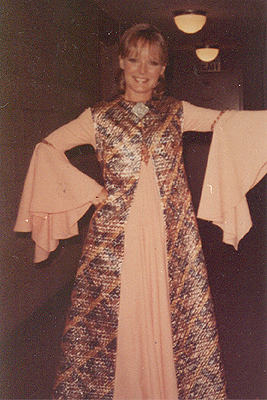
Photo by Gary Schmidt

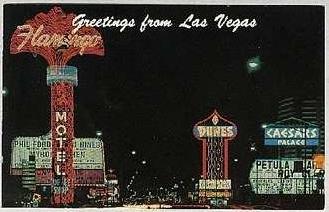
 July 29, 1970
July 29, 1970Odd booking of Petula Clark and Roy Clark should prove interesting to fans of each, because both groups will get a chance to see what happens on the other side of the fence.
Miss Clark, despite her image of the dignified sophisticate, can toss amusing dialog and click as a comedian?he does a very funny impression of a girl singer in the Big Band era. Her songalog is varied, includes tunes with which she's identified such as "Call Me," "Don't Sleep in the Subway" and "Downtown." also memorable are "You and I" (from Goodbye Mr. Chips) and a My Fair Lady medley.
Throughout her turn, with eighty-eighter/conductor Frank Owens brilliantly guiding the Nat Brandwynne orchestra, Miss Clark is a respected, highly entertaining British lady.
Miss Clark, despite her image of the dignified sophisticate, can toss amusing dialog and click as a comedian?he does a very funny impression of a girl singer in the Big Band era. Her songalog is varied, includes tunes with which she's identified such as "Call Me," "Don't Sleep in the Subway" and "Downtown." also memorable are "You and I" (from Goodbye Mr. Chips) and a My Fair Lady medley.
Throughout her turn, with eighty-eighter/conductor Frank Owens brilliantly guiding the Nat Brandwynne orchestra, Miss Clark is a respected, highly entertaining British lady.
 August 8, 1970
August 8, 1970
Petula Clark's sophisticated, cool sultriness is emphasized in her current annual stand here. She is on for an hour, offering a dynamic vocal style which is rich in emotional outpourings and honesty.
The brunt of her material is, familiarly, her own Warner Bros. hits and she received a good reaction from the audience. She uses some new words on "Call Me," her opening number, which leads into "I Know a Place" and then is followed by "Don't Sleep in the Subway" and others before ending the act. She is a strong, assertive vocalist who works hard singing, and leaving the jokes and dance routines to people more in need of these supportive roles.
The brunt of her material is, familiarly, her own Warner Bros. hits and she received a good reaction from the audience. She uses some new words on "Call Me," her opening number, which leads into "I Know a Place" and then is followed by "Don't Sleep in the Subway" and others before ending the act. She is a strong, assertive vocalist who works hard singing, and leaving the jokes and dance routines to people more in need of these supportive roles.
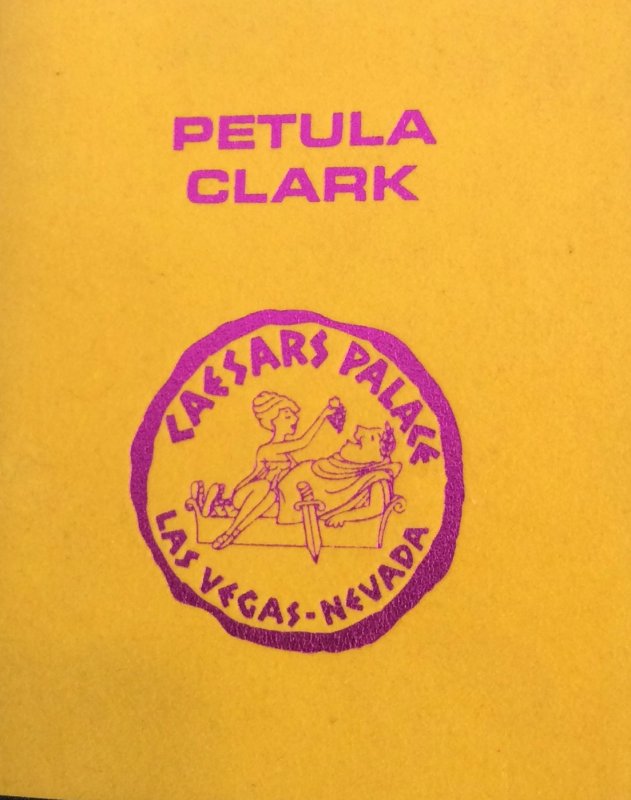
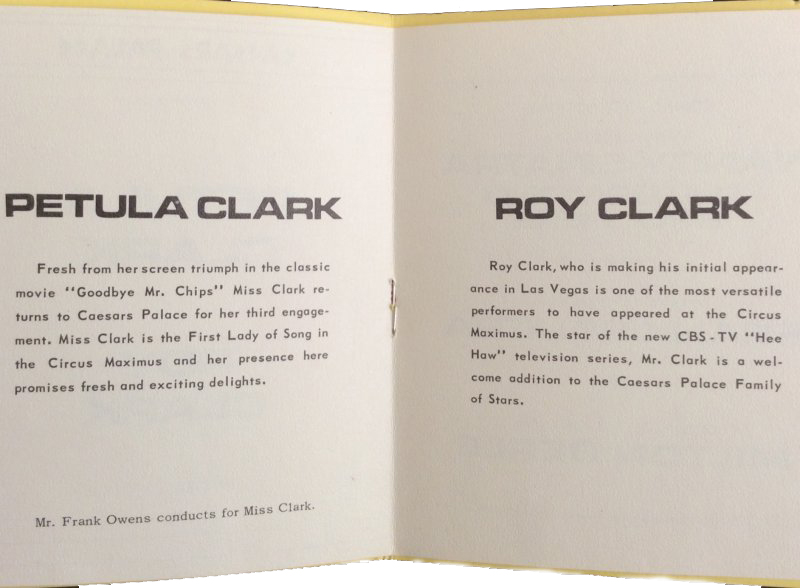
 August 1, 1970
August 1, 1970
Despite serious social turmoil in nearby Asbury Park last week, British songstress Petula Clark drew admiring swarms of summer concertgoers throughout her week-long engagement at the handsome Garden State Arts Center. Her act was polished, combining wit and nonchalance with a distinctive and sensitive singing style, and it no doubt pleased her fans as well as winning her new devotees who had thought of her only as the girl who sings "Downtown."
Basically, Miss Clark's set is constructed around her personal hits, "I Know a Place," "Don't Sleep in the Subway," "This Is My Song," "My Love" and "I Couldn't Live Without Your Love," but she also delivered standards and near-standards like Paul McCartney's "Yesterday" as well as newer material including Simon and Garfunkel's "Bridge Over Troubled Water." Highlights of the evening were a moving interpretation of the vastly underrated Leslie Bricusse ballad "You and I," and a "Beat Goes On" medley, an historical review of rhythm which had the singer performing everything from Strauss-like waltzes to Elvis-flavored rock.
Backing the vocalist was a fine orchestra made up of brass and reeds from the Buddy Rich band, plus strings, plus Clark regulars Hugh McCracken on lead guitar and Kirk Hamilton on bass. Frank Owens, Petula Clark's musical director, conducted from the piano neatly coordinating the overall blend.
Basically, Miss Clark's set is constructed around her personal hits, "I Know a Place," "Don't Sleep in the Subway," "This Is My Song," "My Love" and "I Couldn't Live Without Your Love," but she also delivered standards and near-standards like Paul McCartney's "Yesterday" as well as newer material including Simon and Garfunkel's "Bridge Over Troubled Water." Highlights of the evening were a moving interpretation of the vastly underrated Leslie Bricusse ballad "You and I," and a "Beat Goes On" medley, an historical review of rhythm which had the singer performing everything from Strauss-like waltzes to Elvis-flavored rock.
Backing the vocalist was a fine orchestra made up of brass and reeds from the Buddy Rich band, plus strings, plus Clark regulars Hugh McCracken on lead guitar and Kirk Hamilton on bass. Frank Owens, Petula Clark's musical director, conducted from the piano neatly coordinating the overall blend.
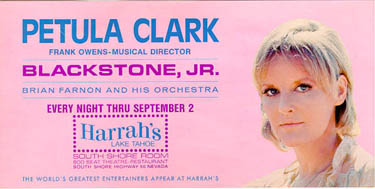 August 26, 1970
August 26, 1970 PETULA AT HARRAH'S
Lake Tahoe, California
with Blackstone Jr.
South Shore Room auditors who board the entertainment bus driven by Petula Clark find they're taken well past the "Downtown" stop to a polished, professional destination. The English lass, whose voice once captivated the below-20 record set, has now developed a charm and bounce endearing to poshery groups. Seemingly the anti-star, she cavorts as if a child entertaining at her parents' dinner party, making guests laugh, cry or admire and, supposedly unwittingly, grasping small portions of their love.
Glamorous in flowing orange, she's the chanteuse with "This Is My Song," the torcher with "Fool on the Hill," the cute clown with a My Fair Lady medley, and a tiny, shy waif as the headliner who gratefully acknowledges her semistanding ovation.
Miss Clark is in constant motion, pacing militarily from one end of the large stage to another as she warbles with a pleasant, controlled throat adaptable to both a rocky "I Know a Place" and a pleading "Glocca Morra." A vigor that occasionally threatens to throw her from the platform is contagious, her fun obvious. Her diction is distinct and is lilting with a solo piano backing of "Long and Winding Road."
She knowingly mingles standard club fare with her applause-drawing remembrances, but even those have been recharted for maximum effectiveness. Almost oblivious to those charts, Miss Clark recites her stories without any reliance on musical director Frank Owens and Brian Famon's orchestra, realizing a cappella might be just as delightful. But some added effects still serve as assets, an echoed mike emphasizing a few of the Clark vocal peculiarities, and lighting calling attention to a few of her moods.
An experienced driver, she knows all the traffic signs, violates hardly any rules, and allows her passengers to disembark only after they've seen not only the downtown area but the complete city.
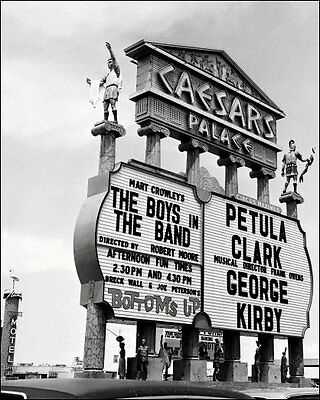
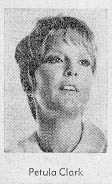
 October 17, 1970
October 17, 1970By Robert Hilburn
Petula Clark was nervous about her opening Thursday night at Caesar's Palace. She was going to try some new things in her act and there's always a certain amount of risk to that.
Instead of spreading her hit recordings (such as "Downtown," "Sign of the Times" and "I Know a Place") throughout the act, she was going to compress them into a medley and introduce new material, including a Rod McKuen poem which she had recently set to music, into the act.
"The safe thing always is to spread the hits out over an entire show," she said. "That gives you all sorts of little islands of security that you can fall back on. But I felt I wanted to do something fresh and new. I wanted to take a little risk. I guess I was getting a little tired of doing the same show over and over again."
Once on stage, Miss Clark proved there was no need to worry. The medley and new material worked smoothly. It's been five years now since Miss Clark, a tiny (5'1", 100 pound) blonde, had her first hit record ("Downtown") in the United States.
Though she was old (around 30) by top-ten record standards, her voice had a lilt to it that gave a youthful energy to her records.
But a voice alone is not enough in Las Vegas. It can sell records and put you across in a concert hall, but you've got to be a performer to succeed here. And Miss Clark is, in the best sense of the word, a performer. She's a thoroughly captivating nightclub attraction, full of life, excitement, humor, charm. She also has marvelous instincts for good contemporary material.
Best of all, she knows how to sing a song. Her background as an actress (she was a child star in England as well as the star of such recent films as Finian's Rainbow and Goodbye Mr. Chips) has given her a natural sense of projection on stage.
She has stage movements that are exactly right when she sings a song, either a ballad or an up-tempo number. She raises her hands gently to emphasize a point, closes her eyes, lets her head tilt back, gives a negative nod to reinforce a lyric line, snaps her fingers. All perfect for the songs.
Because her charm and delivery are so much a part of her act, she seems least effective when she sits at the piano to sing "Goin' Out of My Head." Wisely, she uses the piano, which limits her movements, on only that one song.
Miss Clark likes contemporary material (such as "Games People Play" and the Beatles' "Penny Lane" and uses it with understanding and sensitivity.
Miss Clark has a versatile show. It's as pleasant and enjoyable a performance as I've ever seen a femaie vocalist give on a nightclub stage. She'll be at Caesar's Palace with comedian George Kirby through October 28.
"The safe thing always is to spread the hits out over an entire show," she said. "That gives you all sorts of little islands of security that you can fall back on. But I felt I wanted to do something fresh and new. I wanted to take a little risk. I guess I was getting a little tired of doing the same show over and over again."
Once on stage, Miss Clark proved there was no need to worry. The medley and new material worked smoothly. It's been five years now since Miss Clark, a tiny (5'1", 100 pound) blonde, had her first hit record ("Downtown") in the United States.
Though she was old (around 30) by top-ten record standards, her voice had a lilt to it that gave a youthful energy to her records.
But a voice alone is not enough in Las Vegas. It can sell records and put you across in a concert hall, but you've got to be a performer to succeed here. And Miss Clark is, in the best sense of the word, a performer. She's a thoroughly captivating nightclub attraction, full of life, excitement, humor, charm. She also has marvelous instincts for good contemporary material.
Best of all, she knows how to sing a song. Her background as an actress (she was a child star in England as well as the star of such recent films as Finian's Rainbow and Goodbye Mr. Chips) has given her a natural sense of projection on stage.
She has stage movements that are exactly right when she sings a song, either a ballad or an up-tempo number. She raises her hands gently to emphasize a point, closes her eyes, lets her head tilt back, gives a negative nod to reinforce a lyric line, snaps her fingers. All perfect for the songs.
Because her charm and delivery are so much a part of her act, she seems least effective when she sits at the piano to sing "Goin' Out of My Head." Wisely, she uses the piano, which limits her movements, on only that one song.
Miss Clark likes contemporary material (such as "Games People Play" and the Beatles' "Penny Lane" and uses it with understanding and sensitivity.
Miss Clark has a versatile show. It's as pleasant and enjoyable a performance as I've ever seen a femaie vocalist give on a nightclub stage. She'll be at Caesar's Palace with comedian George Kirby through October 28.
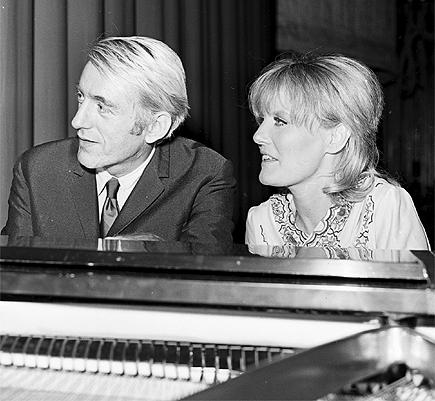
With Rod McKuen October 24, 1970 ©D. Bush
1971
Royal Albert Hall
London, England, UK
Night of 100 Pipers
Charity performance to benefit The Royal Philharmonic Orchestra Trust and the Gurkha Welfare Appeal. Event featured a performance by Petula accompanied by the Royal Philharmonic Orchestra and the Massed Pipes and Drums of three famous regiments, The Black Watch, The Brigade of Gurkhas and The London Scottish T.A.
Royal Albert Hall
London, England, UK
Night of 100 Pipers
Charity performance to benefit The Royal Philharmonic Orchestra Trust and the Gurkha Welfare Appeal. Event featured a performance by Petula accompanied by the Royal Philharmonic Orchestra and the Massed Pipes and Drums of three famous regiments, The Black Watch, The Brigade of Gurkhas and The London Scottish T.A.
Night
of
100
Pipers
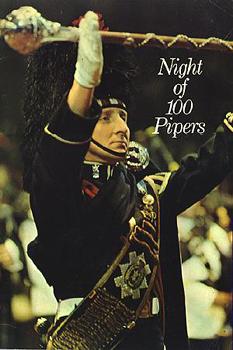
The Night of 100 Pipers was a Charity Gala held at the world famous Albert Hall, London. The performance was in aid of two charities. The Royal Philharmonic Orchestra Trust, whose chief patron was Queen Elizabeth the Queen Mother, and the Gurkha Welfare Appeal whose chief patron was the late Field Marshal The Viscount Slim of Yarralumla and Bishopston KG, GCB, GCMG, GBE, DSO, MC. Admiral of the Fleet Earl Mountbattan of Burma, KG, PC, GCB, OM, GCSI, GCIE, GCVO, DSO, was the guest of honour. The Royal Gala was attended by more than 7,000 distinguished guests from all over the world. The evening was an exciting mixture of orchestral music played by the Royal Philharmonic Orchestra interwoven with the pageantry of The Massed Pipes and Drums of three famous regiments, The Black Watch, The Brigade of Gurkhas and The London Scottish T.A.
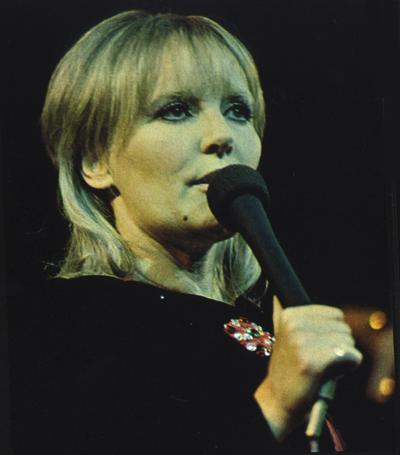
The Gala took eight months of preparation. Rehearsals should have taken weeks. However, for Night of 100 Pipers over 300 men and one woman (Miss Petula Clark) none of whom had ever worked together before, rehearsed the whole programe in a record 5 hours.
Miss Petula Clark made a rare personal appearance in England in aid of the combined charities.
British born 'Pet' who has been singing since she was a very small child has become one of the world's most sought after singers having sold over five million records in America alone. She was accompanied for the first time ever by the Royal Philharmonic Orchestra and a small rhythm section. The Conductor was Mr. Johnny Harris. Her performance thrilled the audience and expecially her many fans who had queued all day for the coveted places at the foot of the stage to hear her sing.
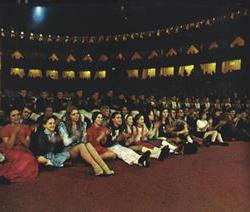
Miss Petula Clark made a rare personal appearance in England in aid of the combined charities.
British born 'Pet' who has been singing since she was a very small child has become one of the world's most sought after singers having sold over five million records in America alone. She was accompanied for the first time ever by the Royal Philharmonic Orchestra and a small rhythm section. The Conductor was Mr. Johnny Harris. Her performance thrilled the audience and expecially her many fans who had queued all day for the coveted places at the foot of the stage to hear her sing.

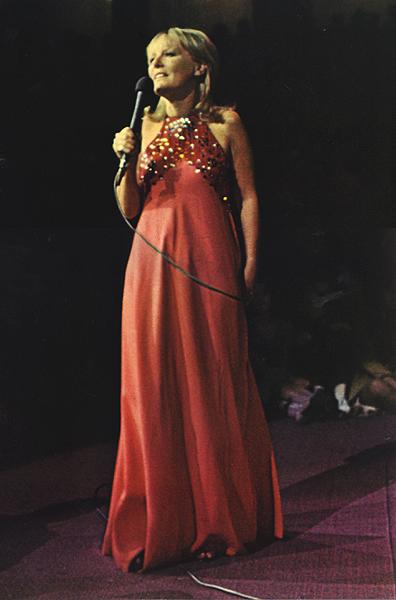
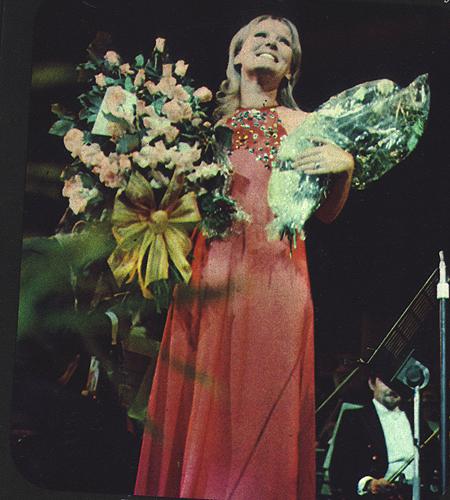
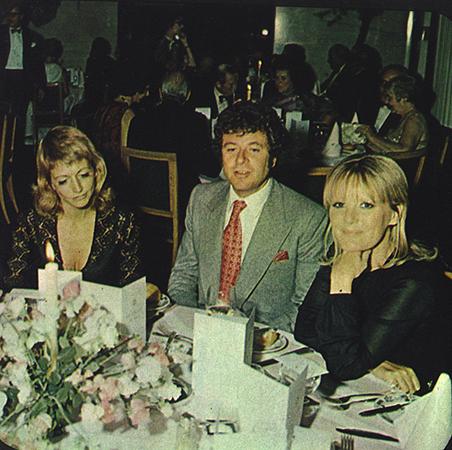
Mrs. Johnny Harris, Claude Wolff and wife Petula
People came from all parts of the world to attend the concert. Some well known and some not so well known. . . After the Gala guests were invited to the Savoy Hotel for a champagne dinner. A band of the Coldstream Guards played till the early hours of the morning.
Carolyn Townshend
Carolyn Townshend
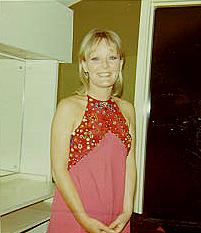
Backstage photo ©Penny Thiele
July, 1971
Antibes, France
July, 1971
Antibes, France
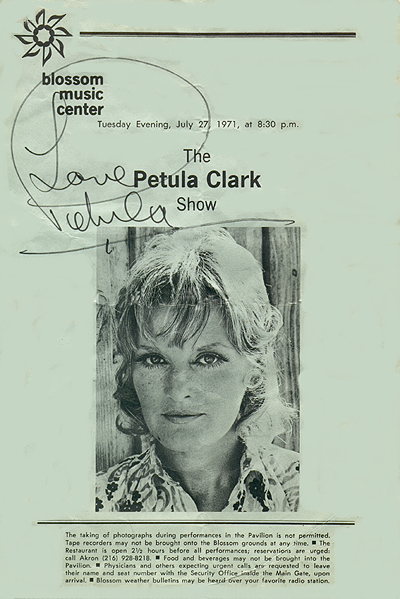

July 28, 1971
Petula Clark Wins Over Blossom Crowd of 6,100
by Frank Hruby
One way for a popular singer to put on a show is to let an auxiliary act come on first and use up half the time. That way she can save herself for the coveted finale spot and end up having to sing only 45 minutes or so.
And then there is the way Petula Clark did it at Blossom Center last night. She came on after the briefest of overtures and stayed for the whole evening of entertainment.
Of course if that is all there was to her show, it would be a gimmick and this review would be over. However, by coupling it with her remarkable singing and even more remarkable stage presence, she won over completely her audience of 6,141.
The "Downtown" and "Don't Sleep in the Subway" girl never takes a song on its own terms. She sculpts each and every phrase and makes it her own, imbuing it and the song with her own brand of communication.
Though she has a wide variety of styles at her disposal, I personally like those which called for positive, forceful treatment and where great tension was called for. Fortunately, she is able to inject this into the larger proportion of her songs, the most notable example of which last night was the "I Don't Know How to Love Him" from Jesus Christ Superstar.
This is a song that has already been done at least a half dozen times this year at Blossom, and I can truthfully say that Petula Clark's version came the closest to greatness.
She had kidded briefly about not being the Mary Magdalene type (she's petite and blonde), but her interpretation of the song, the emotional force and drive were exactly right. Here was not just a popular excerpt from a currently popular work but a thing of vast unsentimental power.
Her vocal style is her own and is quite unique. She likes to play with the "upper neighbor" (this is not hanky-panky - it's a melodic device) and not settle for the actual note until the very last moment. She can spin this trick out to almost excruciating lengths which are not troublesome but provide true dramatically intense moments.
Her pianist and bandleader was Frank Owens, who last night had a stage band of some 25 players, many of them Cleveland Orchestra musicians, providing the musical backdrop.
And then there is the way Petula Clark did it at Blossom Center last night. She came on after the briefest of overtures and stayed for the whole evening of entertainment.
Of course if that is all there was to her show, it would be a gimmick and this review would be over. However, by coupling it with her remarkable singing and even more remarkable stage presence, she won over completely her audience of 6,141.
The "Downtown" and "Don't Sleep in the Subway" girl never takes a song on its own terms. She sculpts each and every phrase and makes it her own, imbuing it and the song with her own brand of communication.
Though she has a wide variety of styles at her disposal, I personally like those which called for positive, forceful treatment and where great tension was called for. Fortunately, she is able to inject this into the larger proportion of her songs, the most notable example of which last night was the "I Don't Know How to Love Him" from Jesus Christ Superstar.
This is a song that has already been done at least a half dozen times this year at Blossom, and I can truthfully say that Petula Clark's version came the closest to greatness.
She had kidded briefly about not being the Mary Magdalene type (she's petite and blonde), but her interpretation of the song, the emotional force and drive were exactly right. Here was not just a popular excerpt from a currently popular work but a thing of vast unsentimental power.
Her vocal style is her own and is quite unique. She likes to play with the "upper neighbor" (this is not hanky-panky - it's a melodic device) and not settle for the actual note until the very last moment. She can spin this trick out to almost excruciating lengths which are not troublesome but provide true dramatically intense moments.
Her pianist and bandleader was Frank Owens, who last night had a stage band of some 25 players, many of them Cleveland Orchestra musicians, providing the musical backdrop.
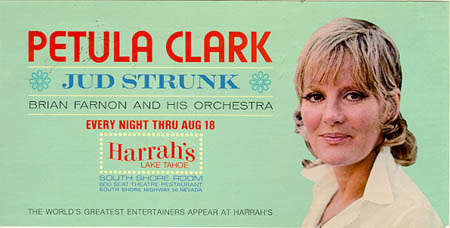
Songs Performed
- Color My World
- You are Everything
- Don't Sleep in the Subway
- Beatles Tribute: Something/Penny Lane/All You Need is Love medley
- Fool on the Hill
- I Couldn't Live Without Your Love
- You've Lost that Lovin' Feeling
- My Love
- This is My Song
- Downtown
- I Don't Know How to Love Him
- You've Got a Friend
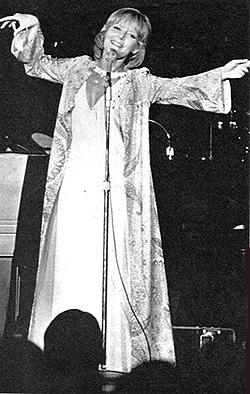
Songs Performed
- I'm Going to Make You Love Me
- Make It With You
- Don't Sleep in the Subway
- Beatles Medley: Something/Penny Lane/All You Need is Love
- Fool on the Hill
- I Couldn't Live Without Your Love
- I Don't Know How to Love Him
- Hits Medley
(My Love/Don't Give Up/This is My Song/I I Know a Place/Downtown) - Going Out of My Head
- You've Got a Friend

September 21, 1971
Songstress-actress Petula Clark is back at Caesar's Palace, and again she's part of one of those off-beat mixtures of co-stars. Last time, Petula was paired with country star Roy Clark; this time it's with Brazil's Sergio Mendes. Sandwiched between the star is comedian Guy Marks, who manages to score his usual solid hit despite the brevity of his stint.
Petula Clark is a magical, theatrical and a highly exacting actress-singer. Pet wrings the most out of a song - her rendition of "Fool on the Hill" is a showstopper - and her program varies nicely from Beatles medley to her own hits to her treatments of "I Don't Know How to Love Him," "Goin' Out of My Head," "I Want to Make it with You," etc. Petula's a charming and gracious hostess and displays a nice flair for comedy touches, wry humor, and a fluid mobility using the huge Caesar's stage. Pianist-conductor Frank Owens and the Nat Brandwynne orchestra aid and abet with unstinting vigor.
Songstress-actress Petula Clark is back at Caesar's Palace, and again she's part of one of those off-beat mixtures of co-stars. Last time, Petula was paired with country star Roy Clark; this time it's with Brazil's Sergio Mendes. Sandwiched between the star is comedian Guy Marks, who manages to score his usual solid hit despite the brevity of his stint.
Petula Clark is a magical, theatrical and a highly exacting actress-singer. Pet wrings the most out of a song - her rendition of "Fool on the Hill" is a showstopper - and her program varies nicely from Beatles medley to her own hits to her treatments of "I Don't Know How to Love Him," "Goin' Out of My Head," "I Want to Make it with You," etc. Petula's a charming and gracious hostess and displays a nice flair for comedy touches, wry humor, and a fluid mobility using the huge Caesar's stage. Pianist-conductor Frank Owens and the Nat Brandwynne orchestra aid and abet with unstinting vigor.

September 22, 1971
Petula Clark has put it all together this trip to score her best impression to date at the Palace. The additional lures of Sergio Mendes & Brasil '77 and Guy Marks help to make this three-framer a hot spot for post-Labor Day visitors.
Miss Clark has never looked the way she sings. Her gowning is often unflattering and coiff styling is a zero, all of which she herself deprecates in a rather mewling fashion during the course of the vocalog. The latter is powerful, however, offsetting whatever impressions not gained by her jejune appearance. Just about every tune she essays is greeted with bursts of applause, the light of recognition extending to the songs not strictly identified as disk hits, yet possessing that certain undefinable style attributed to Petula Clark.
Case in point would be the Beatles collection, in which "Fool on the Hill" is one of the more potent deliveries of the song heard in a long time (she's done it here before). Although Mendes & Brasil '77 had whipped through this same canto earlier, the Clark rendition was a totally new experience of lyric and melody. The topper to her solid repertoire is "I Don't Know How to Love Him," which could become a definitve one, insofar as a nitery presentation would suffice.
The Nat Brandwynne phalanx of musickers is outstanding in all support, with Frank Owens at the keyboard and conducting for Miss Clark. She also uses a femme trio stashed within the string section for more backgrounding effects.
Petula Clark has put it all together this trip to score her best impression to date at the Palace. The additional lures of Sergio Mendes & Brasil '77 and Guy Marks help to make this three-framer a hot spot for post-Labor Day visitors.
Miss Clark has never looked the way she sings. Her gowning is often unflattering and coiff styling is a zero, all of which she herself deprecates in a rather mewling fashion during the course of the vocalog. The latter is powerful, however, offsetting whatever impressions not gained by her jejune appearance. Just about every tune she essays is greeted with bursts of applause, the light of recognition extending to the songs not strictly identified as disk hits, yet possessing that certain undefinable style attributed to Petula Clark.
Case in point would be the Beatles collection, in which "Fool on the Hill" is one of the more potent deliveries of the song heard in a long time (she's done it here before). Although Mendes & Brasil '77 had whipped through this same canto earlier, the Clark rendition was a totally new experience of lyric and melody. The topper to her solid repertoire is "I Don't Know How to Love Him," which could become a definitve one, insofar as a nitery presentation would suffice.
The Nat Brandwynne phalanx of musickers is outstanding in all support, with Frank Owens at the keyboard and conducting for Miss Clark. She also uses a femme trio stashed within the string section for more backgrounding effects.
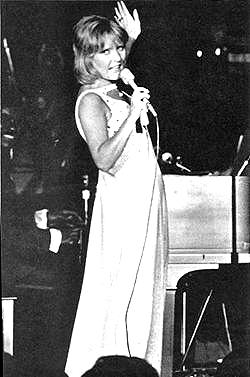
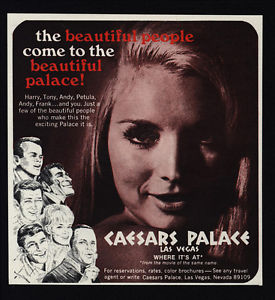
1972

Petula's Nightclub Show Only "Smashingly Superb"
John Huddy
Entertainment Editor
Petula Clark, in a glorious burst of talent and showmanship, is making wide-eyed schoolboys out of all of us in a smashingly superb Diplomat engagement this week. She is beautiful, captivating, charming and mainly is singing the daylights out of one of the finest nightclub shows I've ever seen.
From the moment Pet appears on stage holding a yellow flower and wearing an interesting see-through black blouse, she has our attention. Her first number is great. Her second number is better. Her third number is better. On and on and on she goes through the most arresting and eloquent female performance I've seen in many, many years.
Miss Clark cannot be categorized and there are four or five crumpled pieces of copypaper next to my typewriter at this moment, attesting not only to my own personal awe in the face of such a skill and presence, but also to the complexity of the onetime rock and roll star. Petula is one moment a child, another moment a woman, one moment very young another moment quite mature, and another moment into rhythm and blues, another moment into something quite sophisticated and theatrical.
She talks about the Beatles' famous Fool on the Hill composition, and describes its mystery. Then she sings the song, and for the first time--after hearing the song countless times by numerous accomplished artists--one appreciates the full depth and wisdom of the Lennon-McCartney songwriting team.
But the goose bumps really appear a few minutes later when the Van Smith orchestra roars the theme from Jesus Christ Superstar, seguing quickly into the Mary Magdalene ballad I Don't Know How to Love Him.
It's a rare and sensational moment. One suspects that every breath in the audience is held tightly as the little English lady climbs step by step through the power and agony of the famous Superstar number.
The ending is explosive.
Exhausted, Miss Clark whirls away from the microphone. Equally exhausted the audience explodes in turns with cheers, bravos, shouts of "Great!" "Fantastic!" and "More!"
Miss Clark is actually staggering and there are those among us near the stage who start to move in our chairs, half expecting the diminutive singer to collapse. She looks weary. Spent. Worn.
After she slowly and haltingly moves into a medley of her great hits, a crippled child is lifted to the corner of the stage. The little boy holds out a bright red rose and hands it to the singer, who comes over at once, holds back the tears, and sings My Love, the opening song of her medley. The number rips her, and us, apart.
But the rose speaks for us all.
John Huddy
Entertainment Editor
Petula Clark, in a glorious burst of talent and showmanship, is making wide-eyed schoolboys out of all of us in a smashingly superb Diplomat engagement this week. She is beautiful, captivating, charming and mainly is singing the daylights out of one of the finest nightclub shows I've ever seen.
From the moment Pet appears on stage holding a yellow flower and wearing an interesting see-through black blouse, she has our attention. Her first number is great. Her second number is better. Her third number is better. On and on and on she goes through the most arresting and eloquent female performance I've seen in many, many years.
Miss Clark cannot be categorized and there are four or five crumpled pieces of copypaper next to my typewriter at this moment, attesting not only to my own personal awe in the face of such a skill and presence, but also to the complexity of the onetime rock and roll star. Petula is one moment a child, another moment a woman, one moment very young another moment quite mature, and another moment into rhythm and blues, another moment into something quite sophisticated and theatrical.
She talks about the Beatles' famous Fool on the Hill composition, and describes its mystery. Then she sings the song, and for the first time--after hearing the song countless times by numerous accomplished artists--one appreciates the full depth and wisdom of the Lennon-McCartney songwriting team.
But the goose bumps really appear a few minutes later when the Van Smith orchestra roars the theme from Jesus Christ Superstar, seguing quickly into the Mary Magdalene ballad I Don't Know How to Love Him.
It's a rare and sensational moment. One suspects that every breath in the audience is held tightly as the little English lady climbs step by step through the power and agony of the famous Superstar number.
The ending is explosive.
Exhausted, Miss Clark whirls away from the microphone. Equally exhausted the audience explodes in turns with cheers, bravos, shouts of "Great!" "Fantastic!" and "More!"
Miss Clark is actually staggering and there are those among us near the stage who start to move in our chairs, half expecting the diminutive singer to collapse. She looks weary. Spent. Worn.
After she slowly and haltingly moves into a medley of her great hits, a crippled child is lifted to the corner of the stage. The little boy holds out a bright red rose and hands it to the singer, who comes over at once, holds back the tears, and sings My Love, the opening song of her medley. The number rips her, and us, apart.
But the rose speaks for us all.

Petula Clark Fabulous at Cafe Cristal
Hal Pearl
Amusement Editor - January 24, 1972
Any composer fortunate enough to have his song sung by Petula Clark should thank his lucky stars.
I don't think there's a contemporary singer around today who can make a song come alive like the diminuitive blonde British lovely.
A good example is "Penny Lane," one of the Beatle numbers in ther repertoire in her latest appearance at the Diplomat Cafe Cristal.
I've heard it sung by numerous personalities of note, but the number, though always pleasant to hear, was just another contemporary good tune to my ears.
However, when dynamic Petula delivers it, it's a delightful melodic study of typical British folk. The words have meaning, and the colorful street suddenly comes alive via Miss Clark's demonstative performance.
She imparts a distinctive character to every song, and as a result makes each of nine songs an entirely different vocal experience to thrill the audience.
Outstanding Arrangements
Her musical arrangements are in a class by themselves. Her group of four musicians create a striking musical pattern for Van Smith's fine orchestra to embellish.
Never is an instrument distracting. The brasses are mellow. It's perfect blending and background for the fantastic voice of marvelous Petula Clark.
High point of her performance is the thrilling version of "I Don't Know How to Love Him," from "Jesus Christ Superstar." An intense projection it takes the vibrant singer at least a minute to regain control of her emotions after she sings it.
Her phrasings throughout are superlative. Outstanding dramatic and dynamic demonstrations of this occur in "Fool on the Hill."
She usurps the piano from her magnificent conductor-arranger Frank Owens. And seated at the baby grand she makes a very familiar tune, "Going Out of My Head," sound vitally fresh with her vivid rendition.
She sings her big recording hits, among them "My Love" and, of course, "Downtown."
As she sang the latter, you realize what a plateau Petula Clark has attained in the world of entertainment since that song was first recorded.
She rightfully has gained an undisputed position on top of that world.
Hal Pearl
Amusement Editor - January 24, 1972
Any composer fortunate enough to have his song sung by Petula Clark should thank his lucky stars.
I don't think there's a contemporary singer around today who can make a song come alive like the diminuitive blonde British lovely.
A good example is "Penny Lane," one of the Beatle numbers in ther repertoire in her latest appearance at the Diplomat Cafe Cristal.
I've heard it sung by numerous personalities of note, but the number, though always pleasant to hear, was just another contemporary good tune to my ears.
However, when dynamic Petula delivers it, it's a delightful melodic study of typical British folk. The words have meaning, and the colorful street suddenly comes alive via Miss Clark's demonstative performance.
She imparts a distinctive character to every song, and as a result makes each of nine songs an entirely different vocal experience to thrill the audience.
Outstanding Arrangements
Her musical arrangements are in a class by themselves. Her group of four musicians create a striking musical pattern for Van Smith's fine orchestra to embellish.
Never is an instrument distracting. The brasses are mellow. It's perfect blending and background for the fantastic voice of marvelous Petula Clark.
High point of her performance is the thrilling version of "I Don't Know How to Love Him," from "Jesus Christ Superstar." An intense projection it takes the vibrant singer at least a minute to regain control of her emotions after she sings it.
Her phrasings throughout are superlative. Outstanding dramatic and dynamic demonstrations of this occur in "Fool on the Hill."
She usurps the piano from her magnificent conductor-arranger Frank Owens. And seated at the baby grand she makes a very familiar tune, "Going Out of My Head," sound vitally fresh with her vivid rendition.
She sings her big recording hits, among them "My Love" and, of course, "Downtown."
As she sang the latter, you realize what a plateau Petula Clark has attained in the world of entertainment since that song was first recorded.
She rightfully has gained an undisputed position on top of that world.
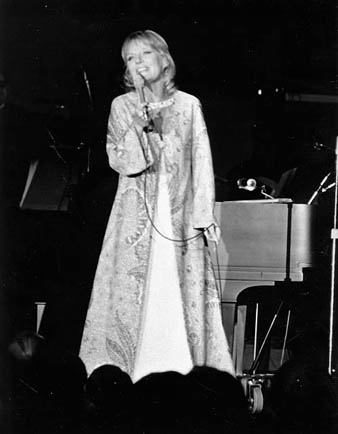
Songs Performed
- Color My World
- You are Everything
- Don't Sleep in the Subway
- Beatles Tribute:
Something/Penny Lane/All You Need is Love medley Fool on the Hill - I Couldn't Live Without Your Love
- You've Lost that Lovin' Feeling
- My Love
- This is My Song
- Downtown
- Introduction of musicians
- I Don't Know How to Love Him
- You've Got a Friend
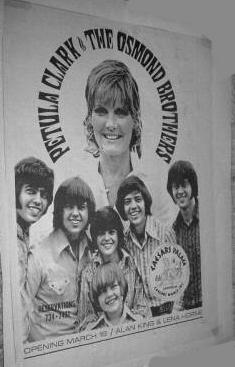

March 22, 1972
The musical collection of Petula Clark and the Osmond Brothers is one of those blockbusters for anytime of the year and destined to put up the SRO flag. This fortnighter sees the powerhouse combinations in fine fettle after a brief one-night hiatus by Miss Clark when a bad cold overpowered her.
The show is too long, running 90 minutes and dinning with excessive amplification until listening fatigue sets in surely, but definitely in the latter stages of the Clark vocalog. The double set of speakers onstage face outward to magnify the sound, augmenting the already bursting cones of the house system. The Brandwynne orchestra is also doubly amped. It is a painful experience and most audiences were holding their ears throughout the final 15 minutes.
Following the Osmonds is rough. Miss Clark acknowledges the old axiom of show biz regarding children and animal acts but graciously admits to the youths' impressive following out front, from kindergarten moppers on up.
One of her better sessions within the session includes a Beatles skein. She is the ex-quartet's best ambassador and does a job on any one of their songs almost as impressive as the originals. This is especially true of "Fool on the Hill." Her own hit medley excites much applause into and out of each tune.
The Mary Magdalene cry of "I Don't Know How to Love Him," from Jesus Christ Superstar is aimed toward the heights of expression and melodic thrust, but falls short by plenty in the Clark version. It is not a show-off aria, but a simple lied, a heartfelt search not only for love but self understanding. Miss Clark gives it the old stylist pow, overstressing the ending into a strident reach for dramatic punch. It falls next to her closing, "You've Got a Friend," but the damage from the exaggerated decibel level has already taken its toll.
Frank Owens is the sympathefic pianist-conductor charting the course with her rhythm section latched on to the Brandwynne orchestra.
Following the Osmonds is rough. Miss Clark acknowledges the old axiom of show biz regarding children and animal acts but graciously admits to the youths' impressive following out front, from kindergarten moppers on up.
One of her better sessions within the session includes a Beatles skein. She is the ex-quartet's best ambassador and does a job on any one of their songs almost as impressive as the originals. This is especially true of "Fool on the Hill." Her own hit medley excites much applause into and out of each tune.
The Mary Magdalene cry of "I Don't Know How to Love Him," from Jesus Christ Superstar is aimed toward the heights of expression and melodic thrust, but falls short by plenty in the Clark version. It is not a show-off aria, but a simple lied, a heartfelt search not only for love but self understanding. Miss Clark gives it the old stylist pow, overstressing the ending into a strident reach for dramatic punch. It falls next to her closing, "You've Got a Friend," but the damage from the exaggerated decibel level has already taken its toll.
Frank Owens is the sympathefic pianist-conductor charting the course with her rhythm section latched on to the Brandwynne orchestra.
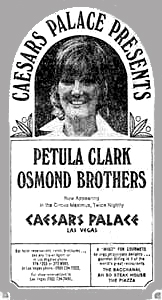
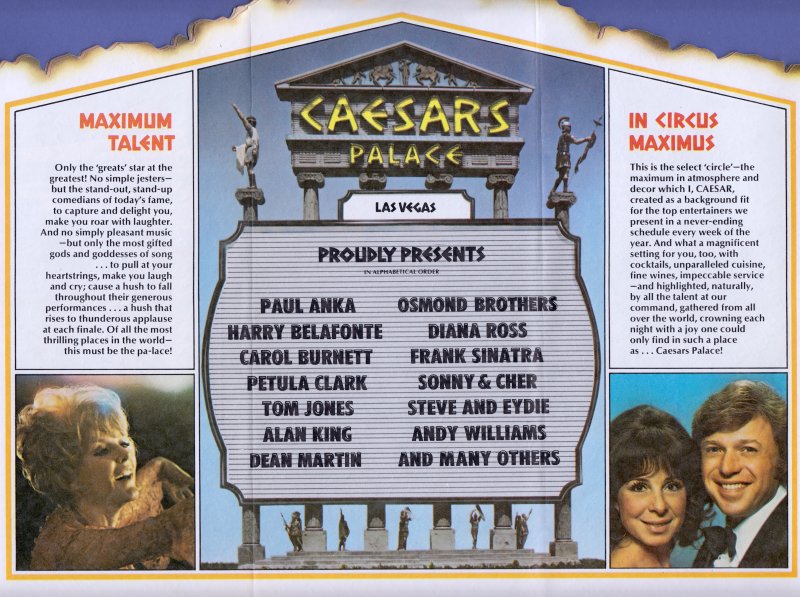
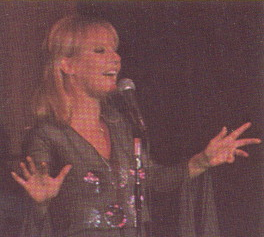
Songs Performed
- Color My World
- You are Everything
- Don't Sleep in the Subway
- Beatles Tribute:
Something/Penny Lane/All You Need is Love medley Fool on the Hill - I Couldn't Live Without Your Love
- You've Lost that Lovin' Feeling
- My Love
- This is My Song
- Downtown
- Introduction of musicians
- I Don't Know How to Love Him
- You've Got a Friend
1973
Royal Festival Hall - London, UK
Odeon - Birmingham, UK
Wakefield Theatre Club - Wakefield, UK
Free Trade Hall - Manchester, UK
Colston Hall - Bristol, UK
Winter Gardens - Bournemouth, UK
Guildhall - Portsmouth, UK
1973 UK Tour
Royal Festival Hall - London, UK
Odeon - Birmingham, UK
Wakefield Theatre Club - Wakefield, UK
Free Trade Hall - Manchester, UK
Colston Hall - Bristol, UK
Winter Gardens - Bournemouth, UK
Guildhall - Portsmouth, UK
1973 UK Tour
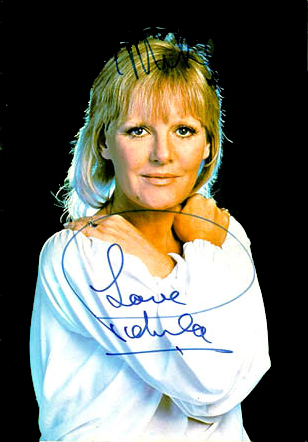
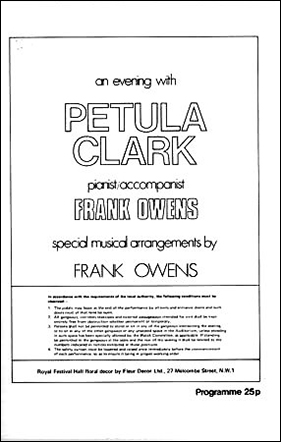

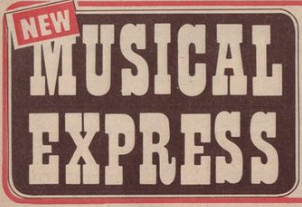
FESTIVAL HALL CONCERT REVIEW
Easy informality was the keynote of the concert by Petula Clark at the Royal Festival Hall last Saturday. The former child star and now three times a mum made cracks about her weight, hinted that she didn't always press her stage dresses before putting them on, and chatted up the audience generally between songs. There was no easy informality about her singing however. She brought in a wealth of professional experience to every song and gave her all so intensely during a moving performance of "I Don't Know How to Love Him" that she had to lean against the piano with her back against the auditorium for a few seconds afterwards to recover her composure.
The programme was well chosen and neatly balanced. A trio of Beatle ballads, a trio of songs from Joni Mitchell, Buffy St. Marie and Carole King, current classy pop goodies such as " I Want to Make it With You" "What the World Needs Now," "Without You," and "Wedding Song," a medley of hits from her early career and Jacques Brel's "Un Enfant" specially written for her, were mingled with the familiar and still potent string of Clark hits hatched by Tony, including "Don't Sleep in the Subway," "I Couldn't Live Without Your Love." "I Know a Place" and Downtown.
She finished her encores by kicking off her shoes, sitting at the side of the stage and giving what must have been her first public performance of "Killing Me Softly with His Song," judging by her use of a song copy.
It was a fittingly informal end to a one-woman performance of impressive but unpretentious quality, aided by her excellent M.D. Frank Owens and a first class concert orchestra.
The programme was well chosen and neatly balanced. A trio of Beatle ballads, a trio of songs from Joni Mitchell, Buffy St. Marie and Carole King, current classy pop goodies such as " I Want to Make it With You" "What the World Needs Now," "Without You," and "Wedding Song," a medley of hits from her early career and Jacques Brel's "Un Enfant" specially written for her, were mingled with the familiar and still potent string of Clark hits hatched by Tony, including "Don't Sleep in the Subway," "I Couldn't Live Without Your Love." "I Know a Place" and Downtown.
She finished her encores by kicking off her shoes, sitting at the side of the stage and giving what must have been her first public performance of "Killing Me Softly with His Song," judging by her use of a song copy.
It was a fittingly informal end to a one-woman performance of impressive but unpretentious quality, aided by her excellent M.D. Frank Owens and a first class concert orchestra.

ODEON CONCERT REVIEW
. . . at the Odeon, New Street, Birmingham
Petula Clark paid tribute to the Beatles in this concert with such memorable songs as All you need is love, Love is all you need . . .
"it's not the same on television," she told the audience at the two-hour performance. And she was right. On stage she looks small, but her voice is powerful.
Undoubtedly, she is an outstanding musician and a versitile one. She is comical when she sings the songs of her early years, Romeo and Sailor. She is nostalgic when she sings Downtown and I Know a Place, the hits of the early 1960s which estabished her as a mature entertainer.
She is magnificent, moving--and moved when she sings The Wedding Song and Mary Magdalene's song from the musical Jesus Christ, Superstar.
Miss Clark was well supported by pianist Frank Owens and orchestra--a performance that supported the promise she gave when she set foot in England to prepare for this exhausting British tour (she opened at the Royal Festival Hall on Saturday.
In her Press interviews, Miss Clark said that all she wants to do is sing. No frills. No gadabout gimmicks. and when you are in her audience, that is all you need.
J.A.


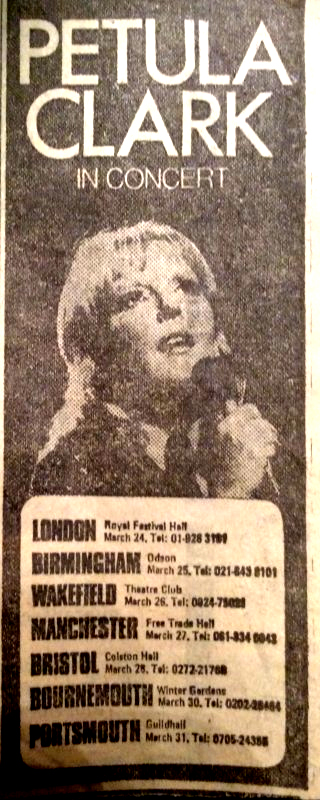
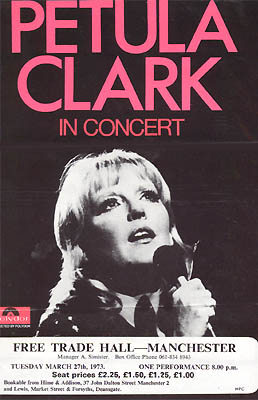
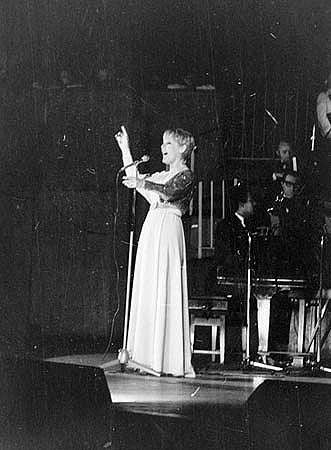
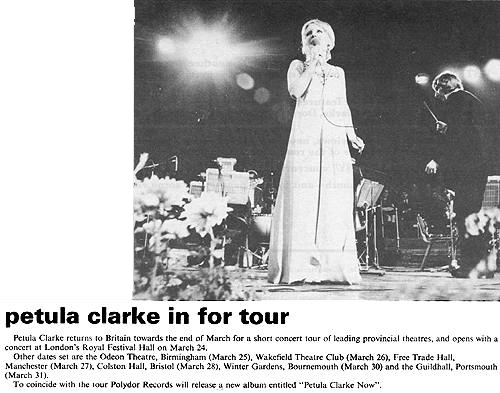
Note misspelling of "Clark" and photo, of course, is from '69 Albert Hall Concert

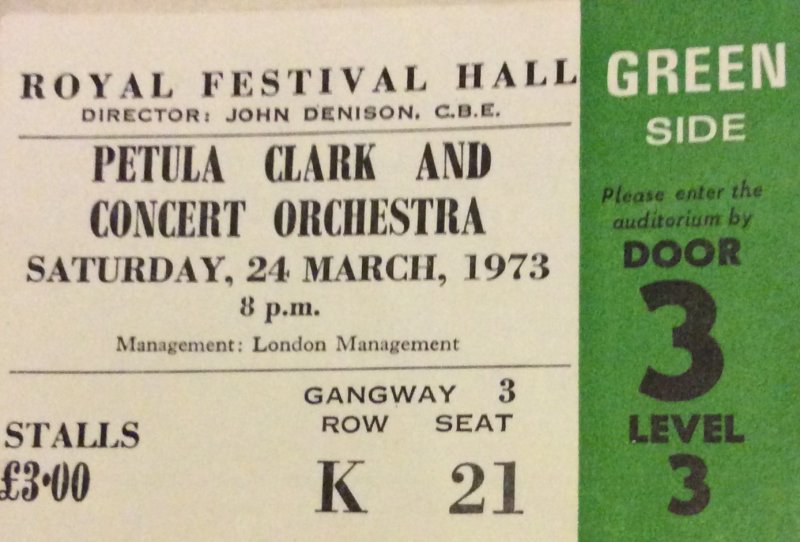
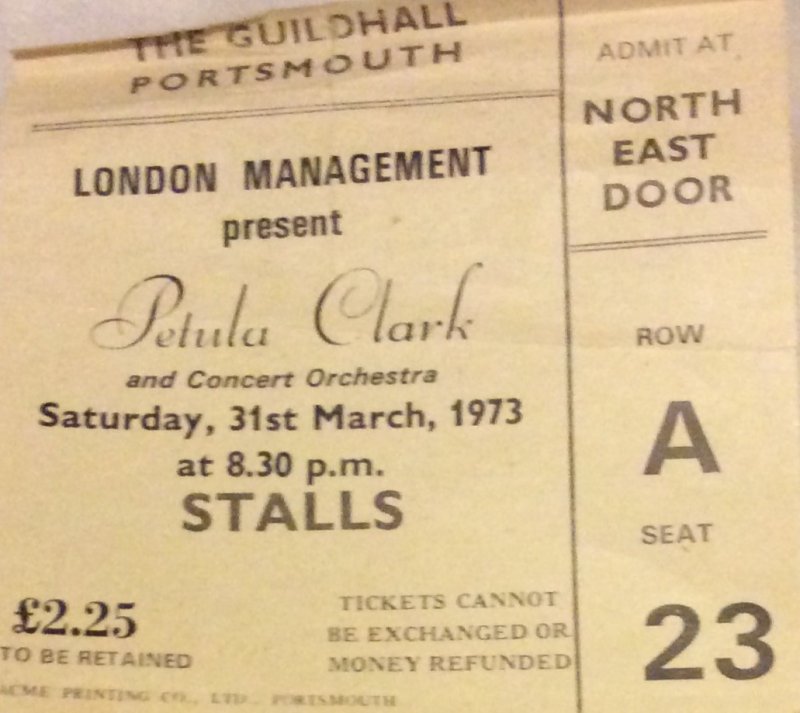
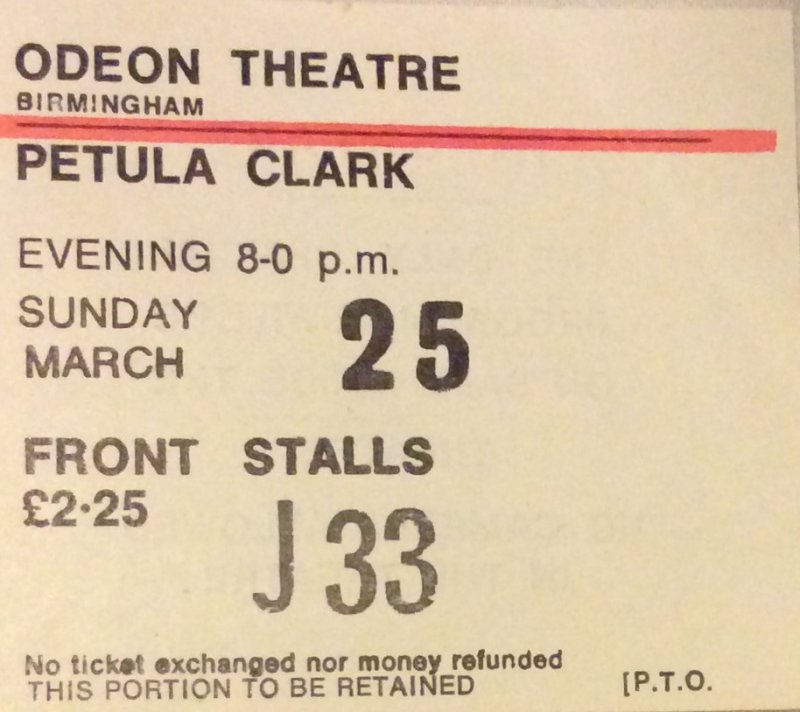

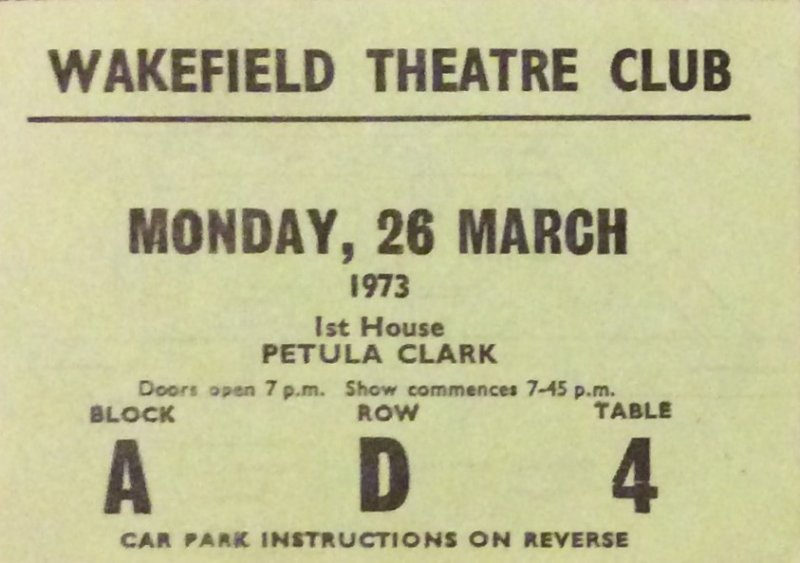
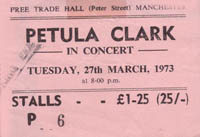
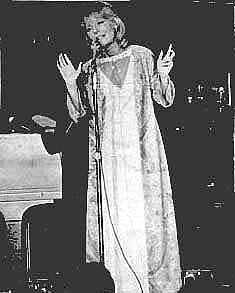
 April 18, 1973
April 18, 1973 Petula Clark makes one of her periodic journeys to Caesar's Palace and the fortnight promises to be a stimulating one on several counts. The record charts haven't been blessed of late by a rash of Clark ditties as of yore, yet there seems to be no diminution of her popularity to Vegas crowds. The inclusion of her top charters, cleffed by Tony Hatch within the well-proportioned vocalog brings an extra acclamation upon opening measures and at the finishes.
Her projection is generally fine except for the piping of too many forceful, over-modulated notes at codas of some tunes. "I Don't Know How to Love Him" is marred by the keening push at the close, as are a couple of numbers in the female composers medley. The interim verbal notes are neatly expressed, with British humor shining through some of the more or less deadpan observations.
The Nat Brandwynne orchestra does its job with musicianly expertise, led by Frank Owens for Miss Clark. Miss Clark has her rhythm section to aid the various charts and a quartet of warblers in support, introduced as the Beverly Henshaw singers.
Her projection is generally fine except for the piping of too many forceful, over-modulated notes at codas of some tunes. "I Don't Know How to Love Him" is marred by the keening push at the close, as are a couple of numbers in the female composers medley. The interim verbal notes are neatly expressed, with British humor shining through some of the more or less deadpan observations.
The Nat Brandwynne orchestra does its job with musicianly expertise, led by Frank Owens for Miss Clark. Miss Clark has her rhythm section to aid the various charts and a quartet of warblers in support, introduced as the Beverly Henshaw singers.
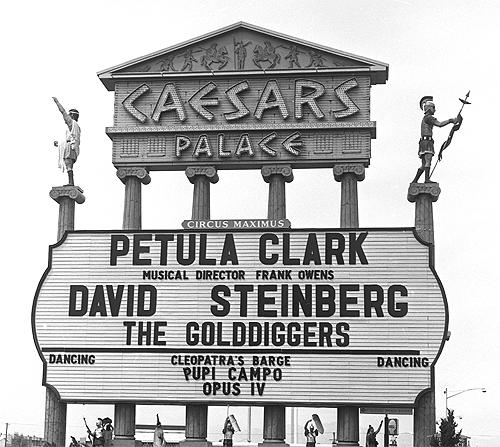
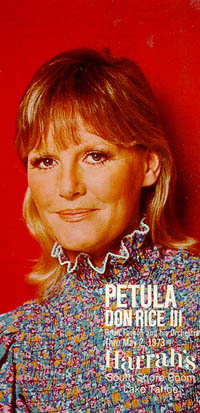
Song List
- Color My World/You Are the Sunshine of My Life
- Don't Sleep in the Subway
- Beatles medley: Something/Penny Lane/All You Need is Love
- You and I
- I Couldn't Live Without Your Love
- Your Cheatin' Heart
- Until it's Time for You to Go
- You've Got a Friend
- Band introductions
- I Don't Know How to Love Him
- What the World Needs Now
- Downtown
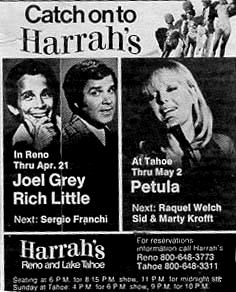
 May 2, 1973
May 2, 1973 Petula Clark's enduring prettiness and easy, humorous audience rapport could probably capture a room on their own merits. Her vocal distinction, clean phrasing and true pitch combine as well to make this one of the more winning shows of the present season, packed with good music and an easy, familiar mood, in refreshing contrast to the merciless upbeat straining of many acts.
Opening medley of "I Can See Clearly Now," "Blue Skies" and "On a Clear Day" combines these songs in a manner no lesser chirp should attempt. "This Is My Song" comes on with humorous intro in the style of prim British lady which Miss Clark kids to good effect. Quartet of "marvelous, unsloppy songs" by femme composers varies things nicely, and "I Don't Know How to Love Him," chestnut though it is at this point, comes off sounding new thanks to the star and particularly to conductor Frank Owens' rippling arrangement. "Downtown" and "Don't Sleep in the Subway" are also tossed in for Petula fans and sound good as new.
Particular credit should go to Miss Clark's husband-manager Claude Wolff for his sensitive, mood modulated lighting, transfomming the backdrop into an unobtrusive but extremely effective color counterpoint to the songs.
In all, it's a show of rare harmony. Miss Clark has not made a long Reno Tahoe stand in more than a year, but judging by audience response, her command of the area has not faltered.
Opening medley of "I Can See Clearly Now," "Blue Skies" and "On a Clear Day" combines these songs in a manner no lesser chirp should attempt. "This Is My Song" comes on with humorous intro in the style of prim British lady which Miss Clark kids to good effect. Quartet of "marvelous, unsloppy songs" by femme composers varies things nicely, and "I Don't Know How to Love Him," chestnut though it is at this point, comes off sounding new thanks to the star and particularly to conductor Frank Owens' rippling arrangement. "Downtown" and "Don't Sleep in the Subway" are also tossed in for Petula fans and sound good as new.
Particular credit should go to Miss Clark's husband-manager Claude Wolff for his sensitive, mood modulated lighting, transfomming the backdrop into an unobtrusive but extremely effective color counterpoint to the songs.
In all, it's a show of rare harmony. Miss Clark has not made a long Reno Tahoe stand in more than a year, but judging by audience response, her command of the area has not faltered.

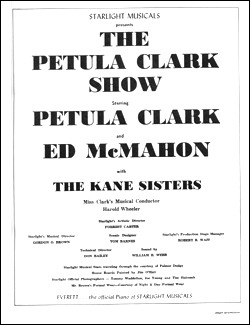

Ed and Pet Please Starlighters
by Corbin Patrick
July 17, 1973
Starlight Musicals, taking a week off from Broadway shows, entertained its audience with a double feature last night - a comedy hour with Ed McMahon, the jolly pitchman of the Johnny Carson TV show, followed by an hour of song with the incomparable Petula Clark.
They were quite different, of course. But there was room for both under the big sky that covers Starlight's amphitheater. And the audience, officially estimated at 2,784, gave both a warm and friendly reception. They will continue in tandem every night through Sunday.
Miss Clark, as everybody should know by now, is a delightful singer, with a voice that can belt a rock song clear out of sight, and coo of love as softly as the proverbial dove.
Working in front of a 25-piece orchestra augmented by a female vocal quartet, she specialized in songs of the day's outstanding pop writers, including the Beatles, Hal David and Burt Bacharach, Leslie Bricusse, and - surprise -Charlie Chaplin. She makes a happy sound that radiates a kindly, sympathetic feeling toward people. Miss Clark is a heart as well as a voice. She is a gracious person.
She began this, her first American concert performance in several years, with songs ranging from "Color My World" to "Don't Sleep in the Subway." Then she recalled favorite numbers by the Beatles, which certainly include some of the most delicately poetic words and music conceived by contempomry pop writers.
She rekindled the love message in the David-Bacharach "What the World Needs Now," revealed the charm of Chaplin's graceful little serenade composed for his film The Countess from Hong Kong and had the audience in a mood to listen to her all night by which time we had to leave.
by Corbin Patrick
July 17, 1973
Starlight Musicals, taking a week off from Broadway shows, entertained its audience with a double feature last night - a comedy hour with Ed McMahon, the jolly pitchman of the Johnny Carson TV show, followed by an hour of song with the incomparable Petula Clark.
They were quite different, of course. But there was room for both under the big sky that covers Starlight's amphitheater. And the audience, officially estimated at 2,784, gave both a warm and friendly reception. They will continue in tandem every night through Sunday.
Miss Clark, as everybody should know by now, is a delightful singer, with a voice that can belt a rock song clear out of sight, and coo of love as softly as the proverbial dove.
Working in front of a 25-piece orchestra augmented by a female vocal quartet, she specialized in songs of the day's outstanding pop writers, including the Beatles, Hal David and Burt Bacharach, Leslie Bricusse, and - surprise -Charlie Chaplin. She makes a happy sound that radiates a kindly, sympathetic feeling toward people. Miss Clark is a heart as well as a voice. She is a gracious person.
She began this, her first American concert performance in several years, with songs ranging from "Color My World" to "Don't Sleep in the Subway." Then she recalled favorite numbers by the Beatles, which certainly include some of the most delicately poetic words and music conceived by contempomry pop writers.
She rekindled the love message in the David-Bacharach "What the World Needs Now," revealed the charm of Chaplin's graceful little serenade composed for his film The Countess from Hong Kong and had the audience in a mood to listen to her all night by which time we had to leave.

A Surprise Preceding Petula: And Now, He-e-e-r-e's Ed!
By Charles Staff
July 17, 1973
Because Petula Clark turned out to be Petula Clark and Ed McMahon turned out to be something else, Starlight Musicals has one of the most entertaining shows of this or any other season on its hands.
The first "special" of the season, which opened last night at Butler University's Hilton Brown Theater to an audience of 2,784, was split between the two stars, who never met on stage.
If McMahon was a complete surprise, Miss Clark wasn't entirely. Alone in the second part, she was everything one supposed she might be and more.
Looking lovely in a blue pleated empire gown and wish feathery blonde hair, Miss Clark, with dabs of inbetween talk couched in her native English accent, sang for all she was worth, roughly a million, for about an hour and 15 minutes without a letdown.
Of course, the favorites were her familiar hits, such items as "Color My World," "This Is My Song" and her first international splash, "Downtown," which the passing of nine years has not dimmed.
But certainly one of the highlights was her perfommance of Mary Magdalene's song from the rock opera Jesus Christ Superstar, a delivery so packed with feeling and emotion that Miss Clark seemed truly drained by it and on the point of exhaustion.
An excellent stylist with a voice like no other around these days, Miss Clark is versatile enough, capable of intimate or strenuous delivery, that it seemed altogether desirable that she simply continue singing all night.
The Starlight orchestra, conducted by Starlight's own Gordon Brown for McMahon and by Miss Clark's own director, the vastly gifted pianist Harold Wheeler in the second part, was in the finest form possible, particularly when augmented by Miss Clark's personal percussion section.
This winning double header stays through Sunday.
By Charles Staff
July 17, 1973
Because Petula Clark turned out to be Petula Clark and Ed McMahon turned out to be something else, Starlight Musicals has one of the most entertaining shows of this or any other season on its hands.
The first "special" of the season, which opened last night at Butler University's Hilton Brown Theater to an audience of 2,784, was split between the two stars, who never met on stage.
If McMahon was a complete surprise, Miss Clark wasn't entirely. Alone in the second part, she was everything one supposed she might be and more.
Looking lovely in a blue pleated empire gown and wish feathery blonde hair, Miss Clark, with dabs of inbetween talk couched in her native English accent, sang for all she was worth, roughly a million, for about an hour and 15 minutes without a letdown.
Of course, the favorites were her familiar hits, such items as "Color My World," "This Is My Song" and her first international splash, "Downtown," which the passing of nine years has not dimmed.
But certainly one of the highlights was her perfommance of Mary Magdalene's song from the rock opera Jesus Christ Superstar, a delivery so packed with feeling and emotion that Miss Clark seemed truly drained by it and on the point of exhaustion.
An excellent stylist with a voice like no other around these days, Miss Clark is versatile enough, capable of intimate or strenuous delivery, that it seemed altogether desirable that she simply continue singing all night.
The Starlight orchestra, conducted by Starlight's own Gordon Brown for McMahon and by Miss Clark's own director, the vastly gifted pianist Harold Wheeler in the second part, was in the finest form possible, particularly when augmented by Miss Clark's personal percussion section.
This winning double header stays through Sunday.
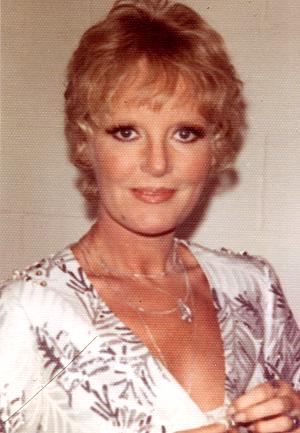
Photo © Gary Schmidt

Song List:
- Color My World/You Are the Sunshine of My Life
- Don't Sleep in the Subway
- Beatles medley: Something/Penny Lane/All You Need is Love
- You and I (from Goodbye Mr. Chips)
- I Couldn't Live Without Your Love
- Your Cheatin' Heart
- You've Got a Friend
- Band introductions
- I Don't Know How to Love Him (from Jesus Christ Superstar)
- What the World Needs Now
- Downtown
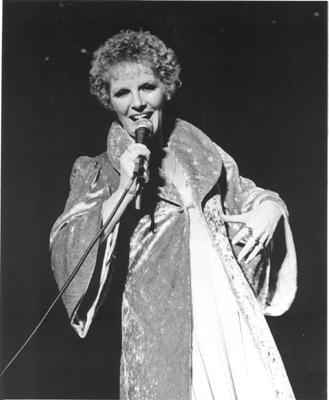
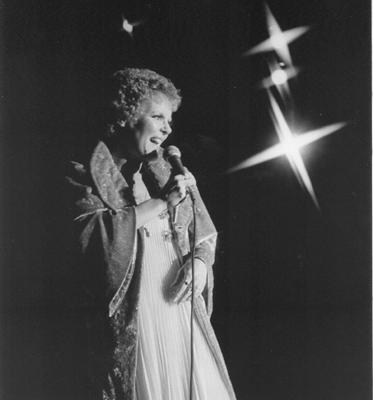
 August 15, 1973
August 15, 1973
The powerful one-two female whammo of Petula Clark and Joan Rivers is destined to be a heavy traffic promoter for the next three weeks. The Clark vocal ministrations follow very closely her previous set here, a 60-minute run-through of tops of pops including several of her own past chart-busters. Although not prominent on the contemporary disk lists, she manages to hold her votaries from other exposures than a hot album or hit record. Displaying a pert personality that pervades all the tunes essayed, there are also neat amounts of vocal elixir in her British humor between songs.
The addition of "Your Cheatin' Heart" this trip charms everyone, purred in simulated cornpone dialect and complete with her Nashville experience in the spoken setup. A couple of minus points are present, one being insistence on amplification gain high enough to induce squealing feedback, and another, some overwrought, squealing measures of "I Don't Know How to Love Him." She needs to rethink the latter song. Musical director Frank Owens is very much in command of the Nat Brandwynne forces, and her backup trio, the Beverly Henshaw Singers, spread animated sounds throughout.
 August 1, 1973
August 1, 1973
Petula Clark and Joan Rivers are the strongest one-two punch on the Strip. We caught them at midnight on Thursday in the Caesar's Palace Circus Maximus. Petula is a Las Vegas lady singing superstar [who is] singing, if that be possible, even better than ever. We especially appreciated the new country-western dimension in the form of "Your Cheatin' Heart." Beautifully gowned this time, a few pounds lighter and in great good humor, Great Britain's number one lady singing superstar export thoroughly delighted a capacity crowd throughout her turn.
One personal criticism to Joan Rivers: Even if Petula Clark asked you to and or gave her blessing, no one, not even if they be as funny and talented as yourself, should do fifty minutes in front of the closing act. If the two of you wish to do forty minutes apiece, great, but the midnight show was like trying to down two pounds of strawberry shortcake with extra heavy whipped cream (not Reddi-Whip) after a lovely meal in the Caesar's Palace Bacchanal - too much!
Kudos due Miss Clark's conductor, Frank Owens, her sidemen, the Beverly Henshaw singers and the ladies and gentlemen of the fantastic Nat Brandwynne orchestra. Joey Preston makes a difference in the drummer's chair - a fine difference.
The addition of "Your Cheatin' Heart" this trip charms everyone, purred in simulated cornpone dialect and complete with her Nashville experience in the spoken setup. A couple of minus points are present, one being insistence on amplification gain high enough to induce squealing feedback, and another, some overwrought, squealing measures of "I Don't Know How to Love Him." She needs to rethink the latter song. Musical director Frank Owens is very much in command of the Nat Brandwynne forces, and her backup trio, the Beverly Henshaw Singers, spread animated sounds throughout.
 August 1, 1973
August 1, 1973Petula Clark and Joan Rivers are the strongest one-two punch on the Strip. We caught them at midnight on Thursday in the Caesar's Palace Circus Maximus. Petula is a Las Vegas lady singing superstar [who is] singing, if that be possible, even better than ever. We especially appreciated the new country-western dimension in the form of "Your Cheatin' Heart." Beautifully gowned this time, a few pounds lighter and in great good humor, Great Britain's number one lady singing superstar export thoroughly delighted a capacity crowd throughout her turn.
One personal criticism to Joan Rivers: Even if Petula Clark asked you to and or gave her blessing, no one, not even if they be as funny and talented as yourself, should do fifty minutes in front of the closing act. If the two of you wish to do forty minutes apiece, great, but the midnight show was like trying to down two pounds of strawberry shortcake with extra heavy whipped cream (not Reddi-Whip) after a lovely meal in the Caesar's Palace Bacchanal - too much!
Kudos due Miss Clark's conductor, Frank Owens, her sidemen, the Beverly Henshaw singers and the ladies and gentlemen of the fantastic Nat Brandwynne orchestra. Joey Preston makes a difference in the drummer's chair - a fine difference.

August 1, 1973
Bravo Sid Gathrid of Caesar's Palace for giving the summer crowds one of the freshest, brightest and most entertaining bookings of the year in the lady stars Petula Clark and Joan Rivers. Destroying the old hand-me-down Strip myth that two females are artistically incompatible and or have ineffectual drawing power, Pet and Joan's opening string of standingroom-only crowds found the duo irresistible.
There's a delightful mix-up of interplay of the stars' talents; Petula does comedy bits, Joan sings. The "raid" on the other's forte only adds to the evening's abundance of style, polish and charm.
It's been quite some time since Petula Clark has been this vivacious, high-spirited or lively. Always a brilliant song stylist with a darling, ringing range, Petula gives each musical selection her own very distinctive treatment, including a tour de force "I Don't Know How to Love Him," an exceptional foray into country music's "Your Cheatin' Heart," a Beatles medley and a medley of songs by lady composers.
Enormously appealing and obviously as popular as ever, Petula invests her talents as an actress-comedienne in dramatic ballads, frothy novelties and utterly charming between-song banter sparkling with her very British, very dry and very witty commentary.
Musical director-pianist Frank Owens conducts the Nat Brandwynne orchestra and Miss Clark's supporting vocal group, the Beverly Henshaw Singers, through Petula's exquisite musical arrangements. Petula's renditions of "Until It's Time for You to Go," "You Are the Sunshine of My Life," "You and I," and her trademarks, "Downtown," "I Couldn't Live Without Your Love" and "Don't Sleep in the Subway" are the lustre and the lilt of an evening's enchantment.
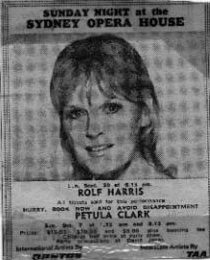
Song List
- Colour My World
- You are the Sunshine of My Life
- Something
- I Know a Place
- "Vintage Petula"
- This is My Song
- My Love
- Don't Sleep in the Subway
- I Couldn't Live Without Your Love
- Wedding Song
- You've Got a Friend
- I Don't Know How to Love Him
- Downtown
- Killing Me Softly
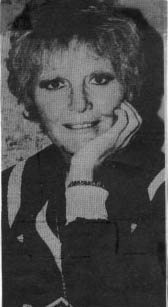
Here's why Pet's a star
Diminutive Petula Clark, one of the world's best female singers, showed the ability, versatility, sensitivity and feminity which has kept her a star for more than 30 years.
Radiant is the best way to describe Petula's looks; electric is the effect she has on an audience.
She has that rare ability to attract and transport one, vocally through her various moods.
And the way she changed moods--from gentle tenderness in a number like "You and I" from Goodbye Mr. Chips to the swinging up-tempo "Call Out My Name" (Note: Aka "Youve Got a Friend") to the sensitive "I Don't Know How to Love Him"--is sheer joy.
She sang some vintage Petula, revealing a wicked sense of humor, and gave a touch of the 'seventies to her hits "I Know a Place," "Don't Sleep in the Subway," "The Wedding Song" and "Downtown."
Her version of "Something": showed beyond doubt the "something" she's got.
Backing Petula with the Geoff Harvey Orchestra was her own rhythm section and vocalists; Rory Markovitz (drums), Kirk Hammett (bass) Ted Irving (guitar) and her pianist-conductor for the past eight years, Frank Owens, who must share some of the credit for her tremendously personal interpretations.
(Note: Actually, her band consisted of Roy Markowitz, Kirk Hamilton and Ted Irwin. The reviewer did manage to spell Frank Owens correctly.)
Radiant is the best way to describe Petula's looks; electric is the effect she has on an audience.
She has that rare ability to attract and transport one, vocally through her various moods.
And the way she changed moods--from gentle tenderness in a number like "You and I" from Goodbye Mr. Chips to the swinging up-tempo "Call Out My Name" (Note: Aka "Youve Got a Friend") to the sensitive "I Don't Know How to Love Him"--is sheer joy.
She sang some vintage Petula, revealing a wicked sense of humor, and gave a touch of the 'seventies to her hits "I Know a Place," "Don't Sleep in the Subway," "The Wedding Song" and "Downtown."
Her version of "Something": showed beyond doubt the "something" she's got.
Backing Petula with the Geoff Harvey Orchestra was her own rhythm section and vocalists; Rory Markovitz (drums), Kirk Hammett (bass) Ted Irving (guitar) and her pianist-conductor for the past eight years, Frank Owens, who must share some of the credit for her tremendously personal interpretations.
(Note: Actually, her band consisted of Roy Markowitz, Kirk Hamilton and Ted Irwin. The reviewer did manage to spell Frank Owens correctly.)
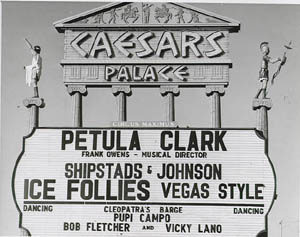
 December 27, 1973
December 27, 1973 British singing star Petula Clark and Shipstad & Johnson Ice Follies combine for a happy holiday attraction at Caesar's Palace. The show continues through Wednesday, after which the theater-restaurant goes dark until January 10, when Paul Anka and the ice show begin a two-week run.
The petite Miss Clark, always ready with a top vocal show during her several seasons with Caesar's, again demonstrates that her efforts appeal to most all age groups.
Her program includes songs for the mod generation and numbers that recall other times for more mature listeners. She runs the pop gamut from such evergreens as "Mona Lisa," "Your Cheatin' Heart" and "The Man That Got Away" to a Gilbert O'Sullivan medley of "Alone Again (Naturally)" and "Get Down."
Of course, there are Petula's other hits too, like "I Know a Place" and "Downtown."
The diminutive star with the big voice comes on strong early with "Sign of the Times" and "Killing Me Softly," continues throughout her well-chosen repertoire with such items as "I Couldn't Live without Your Love," "This Is My Song" and "I Don't Know How to Love Him."
Nat Brandwynne's excellent orchestra provides musical backing with Frank Owens conducting for Miss Clark.
The petite Miss Clark, always ready with a top vocal show during her several seasons with Caesar's, again demonstrates that her efforts appeal to most all age groups.
Her program includes songs for the mod generation and numbers that recall other times for more mature listeners. She runs the pop gamut from such evergreens as "Mona Lisa," "Your Cheatin' Heart" and "The Man That Got Away" to a Gilbert O'Sullivan medley of "Alone Again (Naturally)" and "Get Down."
Of course, there are Petula's other hits too, like "I Know a Place" and "Downtown."
The diminutive star with the big voice comes on strong early with "Sign of the Times" and "Killing Me Softly," continues throughout her well-chosen repertoire with such items as "I Couldn't Live without Your Love," "This Is My Song" and "I Don't Know How to Love Him."
Nat Brandwynne's excellent orchestra provides musical backing with Frank Owens conducting for Miss Clark.
 December 31, 1973
December 31, 1973Petula Clark at her most compelling, whimsical, charming and delightful headlines the new but short holiday show at the Circus Maximus. The newest edition of the Shipstad & Johnson Ice Follies, Las Vegas Style, is bigger, brighter, better and more breathtaking than ever.
Petula Clark's repertoire is longer than usual but certainly one of her most effective and beautiful. Petula's "Yesterday Once More" medley is a brilliant piece that gives the lovely star a chance to demonstrate her versatility with enormous musical style; "G.l. Jive," "Your Cheatin' Heart," "The Man That Got Away" among others are included in the yesterday nostalgia. Her renditions of "Alone Again (Naturally)," "This Is My Song" and "I Don't Know How to Love Him" are a stunning testament to Miss Clark's vocal power, range and dramatic abilities. Musical director-arranger Frank Owens conducts the Nat Brandwynne orchestra beautifully. Claude Wolff's lighting effects are lovely and impressive.
1974
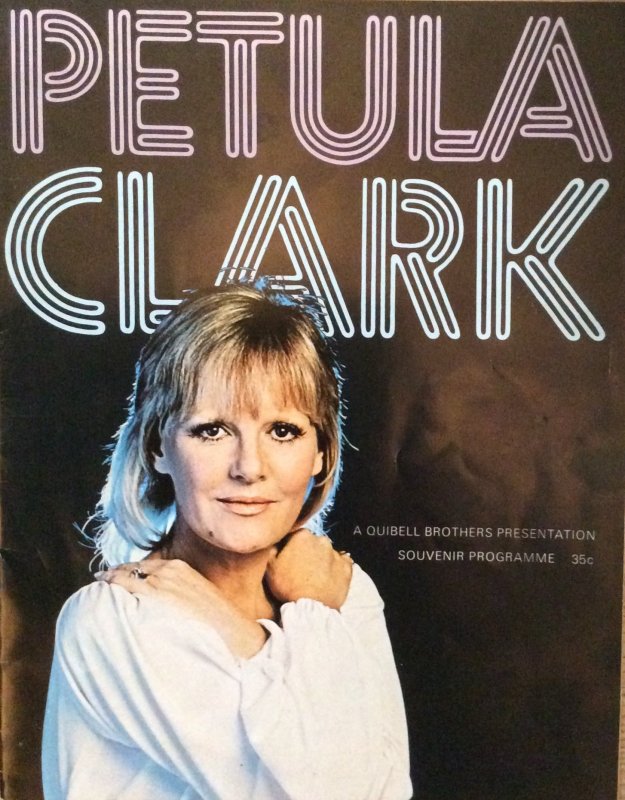
Programme

Ad
REVIEW:
Petula Clark Show
By Michael Venables
(Johannesburg)
Of all the many variety bills the Quibell Brothers have presented in this city this show is far and away the best I have seen. It has a first-rate compere, one good and one superlative supporting act and a star of the first magnitude, the incomparable Petula herself.
It's a bit late to start telling people what a splendid singer she is. Her recordings and the songs she had made famous have been an integral part of our lives for so long that when people look back on the last two decades in years to come she may well be seen to have had almost the same international cultural impact as she credits the Beatles with having exercised as she pays tribute to them in introducing Harrison's "Something" and Lennon and McCartney's "Eleanor Rigby."
But for anyone who might have doubts about her effectiveness as a live performer, I can only say that she is utterly enchanting - a presence as warm and adorable as any I can remember.
Quite naturally and rightly the songs she sings are those her audience expect.
But her greatest ovation last night was for one which, if she has recorded it, I have missed. And that is Mary Magdalene's "I Don't Know How to Love Him," from Jesus Christ Superstar.
I have strong personal reservations about some aspects of that pseudo-religious musical, but none to this particular song, especially when it is so magnificently performed with such sincerity, conviction and depth of feeling.
She is most excellently backed by an augmented Bob Adams orchestra, led by her own musical director and with her own rhythm section and a pretty trio of girl singers. In fact, if I have anything negative to say about the evening, it is that the Colosseum stage is beginning to look alarmingly shabby. With the theatre doomed to demolition not too long from now, one can understand that the owners can't reasonably be expected to fit new curtains, but they might at least clean the old ones.
Petula Clark Show
By Michael Venables
(Johannesburg)
Of all the many variety bills the Quibell Brothers have presented in this city this show is far and away the best I have seen. It has a first-rate compere, one good and one superlative supporting act and a star of the first magnitude, the incomparable Petula herself.
It's a bit late to start telling people what a splendid singer she is. Her recordings and the songs she had made famous have been an integral part of our lives for so long that when people look back on the last two decades in years to come she may well be seen to have had almost the same international cultural impact as she credits the Beatles with having exercised as she pays tribute to them in introducing Harrison's "Something" and Lennon and McCartney's "Eleanor Rigby."
But for anyone who might have doubts about her effectiveness as a live performer, I can only say that she is utterly enchanting - a presence as warm and adorable as any I can remember.
Quite naturally and rightly the songs she sings are those her audience expect.
But her greatest ovation last night was for one which, if she has recorded it, I have missed. And that is Mary Magdalene's "I Don't Know How to Love Him," from Jesus Christ Superstar.
I have strong personal reservations about some aspects of that pseudo-religious musical, but none to this particular song, especially when it is so magnificently performed with such sincerity, conviction and depth of feeling.
She is most excellently backed by an augmented Bob Adams orchestra, led by her own musical director and with her own rhythm section and a pretty trio of girl singers. In fact, if I have anything negative to say about the evening, it is that the Colosseum stage is beginning to look alarmingly shabby. With the theatre doomed to demolition not too long from now, one can understand that the owners can't reasonably be expected to fit new curtains, but they might at least clean the old ones.

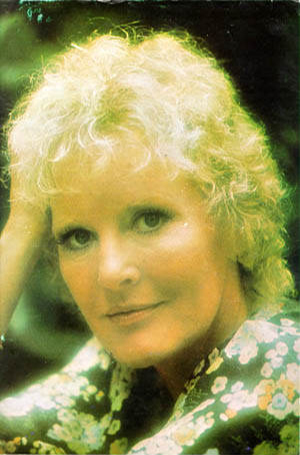
Programme
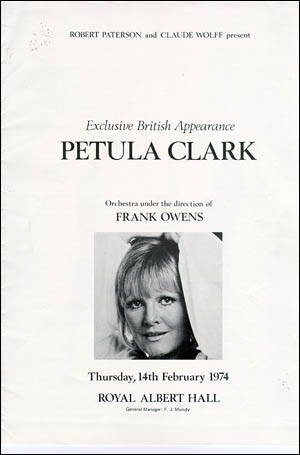
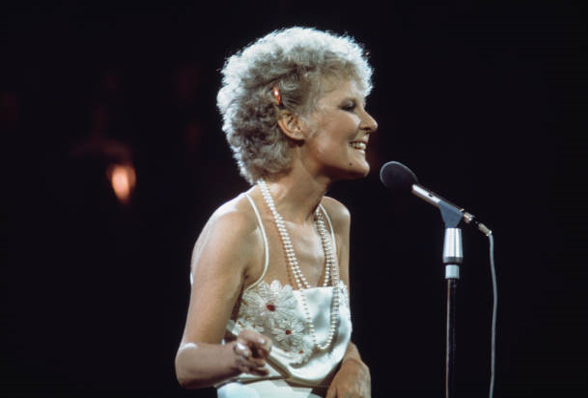
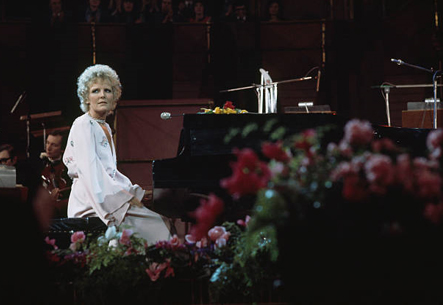
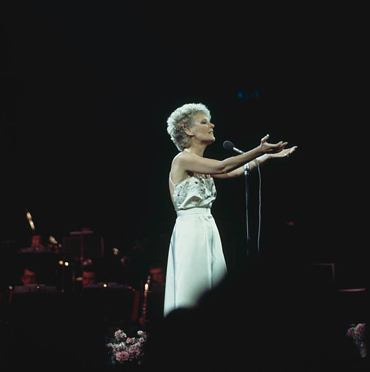
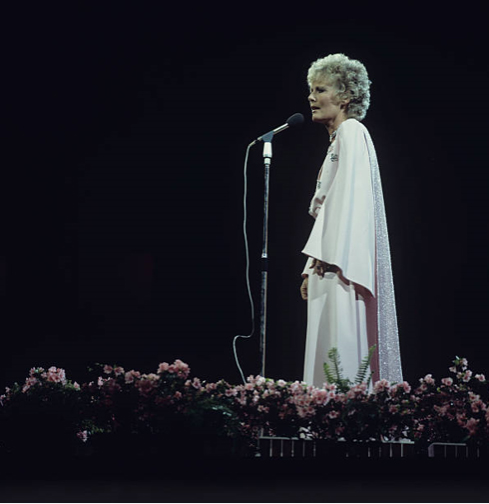
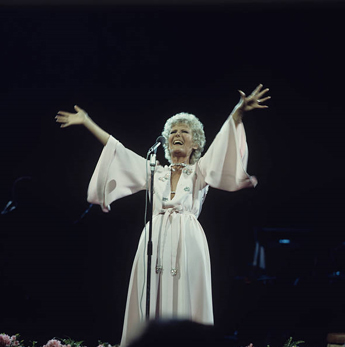
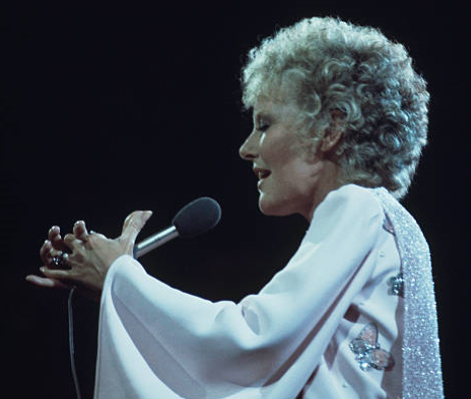
Songs Performed
PART I- Colour My World/You are the Sunshine of My Life
- Don't Sleep in the Subway
- Alone Again, Naturally/Get Down
- London medley
- You and I
- The Other Man's Grass is Always Greener
- Without You
- Music
- This is My Song
- What the World Needs Now is Love
- I Can See Clearly Now/Killing Me Softly with his Song
- I Know a Place
- My Funny Valentine
- Yesterday Once More/G.I. Jive/Mona Lisa/Your Cheatin' Heart/
- The Man That Got Away
- I Couldn't Live Without Your Love
- Une Histoire d'Amour (Love Story)
- You've Got a Friend
- I Don't Know How to Love Him
- My Love/Downtown
- A Song For You

April 11, 1974
It's altogether fitting and proper that Petula Clark's next-to-last engagement for Caesar's Palace should be a compilation of some of her best moments and songs from her last several Palace dates. Clark, who will be back at Caesar's in August and moving to the Riviera Hotel later this year, is at the Circus Maximus with special guest-star Tim Conway making his third appearance.
This time out, her songfest includes a handful of hits of others that she has made her own by her special treatment, such as the Beatles' provocative "Fool on the Hill," or Gilbert O'Sullivan's "Get Down," and several of her own, particularly Chaplin's "This Is My Song," "I Couldn't Live without Your Love," "Don't Sleep in the Subway," and, of course, her trademark "Downtown."
Moreover, Clark is one of those twice-a-year Strip visitors from overseas (like Humperdinck, Newley, Bassey, Jones, etc.) who make each appearance a little more special by adding a distinctly international flavor to their performances.
One of the most naturally witty and amusing performers of that ilk, Petula's quick, dry wit is an audience warmer and charmer.
One of the high spots of her show is her short history of her own musical career, starting with her childhood appearances for the Armed Forces and "G.I. Jive," a tribute to Judy Garland and a stunning "Man That Got Away," and her latest discovery, American country-western music as typified by "Your Cheatin' Heart."
 Her Elegance, Petula Clark, is back from Britain with another of her classy songalogs and this time has Tim Conway aboard for laughs. It adds up to a highly entertaining, casino-sized 80 minutes.
Her Elegance, Petula Clark, is back from Britain with another of her classy songalogs and this time has Tim Conway aboard for laughs. It adds up to a highly entertaining, casino-sized 80 minutes.
Clark's pleasant tones are at home with just about any tune, this time tossing in a Bread medley ("If," "Baby I'm a Want You"), Gilbert O'Sullivan's "Get Down," Charlie Chaplin's "This Is My Song," the Beatles' "Fool on the Hill," a salute to Judy Garland with "The Man That Got Away" and to Nat King Cole with "Mona Lisa." Her whine of the country-western "Your Cheatin' Heart" has a certain cultured earthiness. Unobtrusive, good sounding "Angelettes" femme trio blends; Frank Owens masterfully guides the Nat Brandwynne orchestra.
It's altogether fitting and proper that Petula Clark's next-to-last engagement for Caesar's Palace should be a compilation of some of her best moments and songs from her last several Palace dates. Clark, who will be back at Caesar's in August and moving to the Riviera Hotel later this year, is at the Circus Maximus with special guest-star Tim Conway making his third appearance.
This time out, her songfest includes a handful of hits of others that she has made her own by her special treatment, such as the Beatles' provocative "Fool on the Hill," or Gilbert O'Sullivan's "Get Down," and several of her own, particularly Chaplin's "This Is My Song," "I Couldn't Live without Your Love," "Don't Sleep in the Subway," and, of course, her trademark "Downtown."
Moreover, Clark is one of those twice-a-year Strip visitors from overseas (like Humperdinck, Newley, Bassey, Jones, etc.) who make each appearance a little more special by adding a distinctly international flavor to their performances.
One of the most naturally witty and amusing performers of that ilk, Petula's quick, dry wit is an audience warmer and charmer.
One of the high spots of her show is her short history of her own musical career, starting with her childhood appearances for the Armed Forces and "G.I. Jive," a tribute to Judy Garland and a stunning "Man That Got Away," and her latest discovery, American country-western music as typified by "Your Cheatin' Heart."
 Her Elegance, Petula Clark, is back from Britain with another of her classy songalogs and this time has Tim Conway aboard for laughs. It adds up to a highly entertaining, casino-sized 80 minutes.
Her Elegance, Petula Clark, is back from Britain with another of her classy songalogs and this time has Tim Conway aboard for laughs. It adds up to a highly entertaining, casino-sized 80 minutes.Clark's pleasant tones are at home with just about any tune, this time tossing in a Bread medley ("If," "Baby I'm a Want You"), Gilbert O'Sullivan's "Get Down," Charlie Chaplin's "This Is My Song," the Beatles' "Fool on the Hill," a salute to Judy Garland with "The Man That Got Away" and to Nat King Cole with "Mona Lisa." Her whine of the country-western "Your Cheatin' Heart" has a certain cultured earthiness. Unobtrusive, good sounding "Angelettes" femme trio blends; Frank Owens masterfully guides the Nat Brandwynne orchestra.
Las Vegas Evening Outlook
April 5, 1974
Frankly, there are a number of singers on the circuit today who drive us up the wall. Then, like a breath of fresh air, comes a vocalist who can really sing. Such a singer is Petula Clark.
The diminutive British songstress is back at Caesar's Palace where she appears twice or thrice a year. Usually, when a singer returns to the same location, one has to listen to the same repertory over and over again. This is especially true in Vegas where there is a constant audience turnover. But Miss Clark forgoes this route. She comes up with new material, or at least does not repeat the same material without a long lapse of time.
We don't refer to the "war horses" which the crowd demands - signatures the star has made her trademark. She always included such favorites as "Downtown," "Don't Sleep in the Subway," "Call Me," "I Couldn't Live without Your Love," etc. Think how tired she must get of repeating those, day in and day out, year in and year out!
Her current Caesar's stint also includes "A Song for You," "If," "Baby I'm a Want You," and Charles Chaplin's "This Is My Song," which he wrote for his film The Countess of Hong Kong.
Petula also sings "Get Down" written by the British composer Gilbert O'Sullivan (wonder what his real name is?), which reminds us that another Britisher who adopted the name of a famous composer, Engelbert Humperdinck, is in Las Vegas, currently singing at the Riviera.
But back to Petula. She is also heard in "Yesterday Once More," "G.l. Jive," "Mona Lisa," "Your Cheatin' Heart," "The Man That Got Away" and "Fool On the Hill."
The Nat Brandwynne orchestra is conducted by Frank Owens, and a trio of female vocalists known as the Angelettes provide vocal support and background.
The diminutive British songstress is back at Caesar's Palace where she appears twice or thrice a year. Usually, when a singer returns to the same location, one has to listen to the same repertory over and over again. This is especially true in Vegas where there is a constant audience turnover. But Miss Clark forgoes this route. She comes up with new material, or at least does not repeat the same material without a long lapse of time.
We don't refer to the "war horses" which the crowd demands - signatures the star has made her trademark. She always included such favorites as "Downtown," "Don't Sleep in the Subway," "Call Me," "I Couldn't Live without Your Love," etc. Think how tired she must get of repeating those, day in and day out, year in and year out!
Her current Caesar's stint also includes "A Song for You," "If," "Baby I'm a Want You," and Charles Chaplin's "This Is My Song," which he wrote for his film The Countess of Hong Kong.
Petula also sings "Get Down" written by the British composer Gilbert O'Sullivan (wonder what his real name is?), which reminds us that another Britisher who adopted the name of a famous composer, Engelbert Humperdinck, is in Las Vegas, currently singing at the Riviera.
But back to Petula. She is also heard in "Yesterday Once More," "G.l. Jive," "Mona Lisa," "Your Cheatin' Heart," "The Man That Got Away" and "Fool On the Hill."
The Nat Brandwynne orchestra is conducted by Frank Owens, and a trio of female vocalists known as the Angelettes provide vocal support and background.
April 1974
Unknown venue
Vienna, AUSTRIA
April 1974
Unknown venue
Vienna, AUSTRIA
Live at Caesar's Palace with Anthony Newley
August 8 - 28, 1974
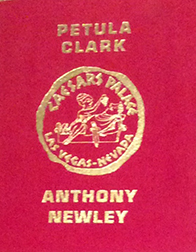
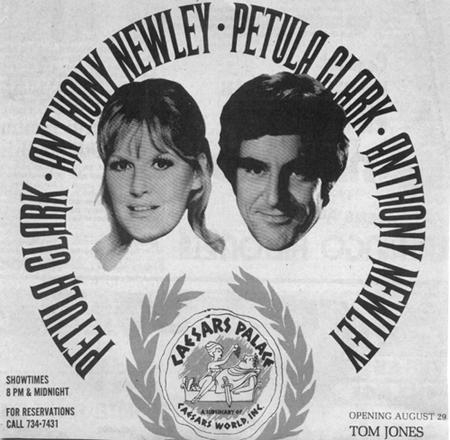
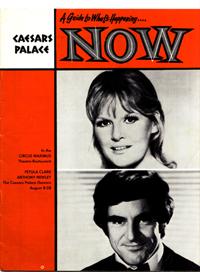
Song List:
Duet with Newley:
Duet with Newley:
- It's a Musical World
- I Know a Place (begun off-stage)
- Killing Me Softly
- Don't Sleep in the Subway
- Alone Again, Naturally/Get Down
- This is My Song
- I've Got a Name
- Seasons in the Sun/If You Go Away
- I Couldn't Live Without Your Love (excerpt)
-
Medley: An Ordinary Couple/We've Only Just Begun/The Honeymoon is Over /Come Back to Me/Won't Last a Day Without You/Kids/Sunrise, Sunset
You and I
 August 21,1974
August 21,1974Petula Clark and Anthony Newley have it all together co-headlining the Circus Maximus room in a rare theatrical treat. Excitement continues right through the show. They open together with "It's a Musical World," which eases into a film clip of a scene showing the two as child thespians. When they return to the stage they're togged as teenagers for a fanciful, funny reprise of a supposed early encounter.
Then it's Newley's turn to galvanize the crowd singing Bricusse and Newley, one hit right after the other. Also included is one of Newley's solo cleffings and "Love Has the Longest Memory," which he wrote for his upcoming film Quilp, and a smash medley of show tunes Newley wishes he had written.
Clark's portion is a potent parade of her many disk clicks winding with a show-stopping "Fool on the Hill." With their proven ability as actors enhancing every number, Clark and Newley win ovations, closing their show with a catchy, romantic medley pegged on "You and I" that's a show in itself. Act could go intact to Broadway with success.
Curtain-raiser is a festive romp by the Caesar's Palace Dancers, six fetching femmes and a male consort. Nat Brandwynne orchestra backs entire party with aplomb.
October 19, 1974
Globe Theatre
Stockton, England
October 19, 1974
Globe Theatre
Stockton, England
 November 27, 1974
November 27, 1974
Looking lovely and elegant as ever, Petula Clark is making her debut at the Riviera's Versailles Room; the showroom, like any room she plays, is quickly and easily hers. Clark continues to be one of the most expressive vocalists and charming personalities on either side of the Atlantic. Petula's off-the-cuff witticisms are zany and unexpected gems.
Musically, she has no limitations. She's as comfortable with intense selections such as "Fool on the Hill" as she is with a just-for-fun "Gypsy"; as familiar with contemporary music like "Feel Like Making Love" as she is with her own long list of hits, including the ever-new "This Is My Song."
New in this outing is her mini-medley to fellow Scorpios like Richard Burton, Spiro Agnew, Grace Kelly, etc., and a lovely "God Bless the Child" dedicated to her son.
"Loving Arms," Clark's new record release, is also spotlighted in the show. A trio of femmes adds backup vocals when appropriate.
 December 14, 1974
December 14, 1974
Frank Gorshin moved from headliner to opening act November 22 and did his headline act, a good 15 minutes more than he should be allowed on stage... The act gets longer and longer and more repetitious.
Petula Clark is a delight. It is a credit to her amazing talent that she was not only capable of waking up a stone cold crowd but keeping them alert and happy. She's a lady and it shows both in her selections and manner of delivery. Newly signed to ABC, she sang her first release, "Loving Arms."
Her Scorpio medley is brand new. It features shots of famous Scorpios on a movie screen with songs to fit their occupations, personalities, love life. It was a cute segment. Over half the act is composed of her record hits. "I Got a Name," which she opens with, is followed by "Let's Put It All Together" and "Feel Like Making Love." Vocally she has never sounded better.
 November 30,1974
November 30,1974
The Riviera Hotel's Versailles Room is just about the classiest showroom in Las Vegas: intimate, comfortable and a showcase for nothing but the best of the "class acts." Such superstars as Barbra Streisand, Liza Minnelli and Herb Alpert have chosen the room in which to present their special sounds.
And there currently, in keeping with such polished practices, Petula Clark and Frank Gorshin are now providing their special brand of first-rate entertainment.
Stepping out on the Versailles Room's stage, it took headliner Petula Clark no more than two seconds to prove that she's a star. But it took those gems of pop perfection Tony Hatch created for her in the Sixties to make her an international one: "I Couldn't Live without Your Love," "Color My World," "Don't Sleep in the Subway" and of course "Downtown," the monstrous little chart-topper that started it all.
As she has said herself in an interview given during her not-so-long-ago Top 40 heyday, she doesn't have the vocal equipment of a Barbra Streisand. You can feel her struggles for certain high notes, but what she does have is far more important: high style, much more than just a touch of class, and you honestly believe everything she sings.
Those who keep thinking of Petula Clark as merely a bouncier version of Helen Reddy with a British accent should see her live. Maybe she'll seem to you like the important entertainer she most definitely is. Though some of her material has already been pounded into the Muzak boneyard through countless renditions by everyone from Frank Sinatra to the Ray Conniff Singers, she could probably sing the exit signs on the Pasadena Freeway and sound refreshing.
She turns Lennon and McCartney's "Fool on the Hill" into her own "magical mystery tour." And on Carole King's fine but oh-so battle-weary "You've Got a Friend" she almost makes you forget about those times you said, "If I hear another version of that song I'm going to scream."
And, of course, she sang "Downtown," "My Love," "Don't Sleep in the Subway" and a couple more of her long string of hits, and sang them as though she didn't care at all about all of those empty tables and chairs in the Versailles Room. Whether it be inflation, preparation for the holidays or a gigantic traffic tie-up on all the roads leading to Vegas, the dinner show was sparsely attended on Tuesday night. And performers as special as Petula Clark and Frank Gorshin should be playing to packed houses every time they take to the stage.

1975
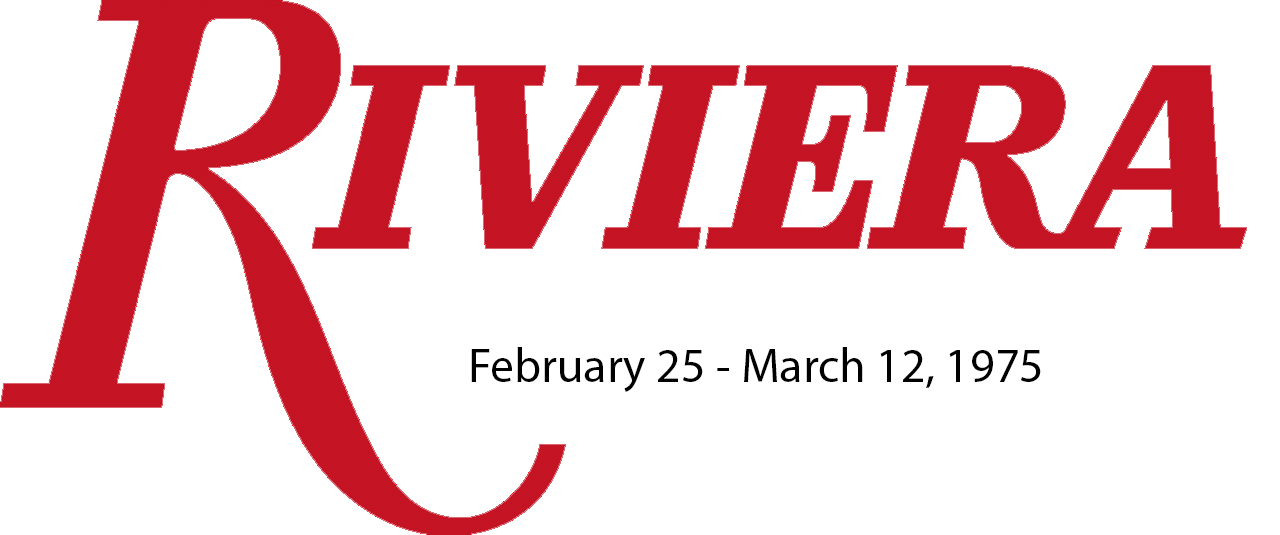


 February 26, 1975
February 26, 1975
Petula Clark, who can claim international disc clicks in several languages, is back at the Riviera and, as usual, has something new to add to her Las Vegas showings. This time, the delightful Britisher reveals talent for dancing, and showing off her long-hidden gams in a charming tribute to Cole Porter, with one selection being "The Laziest Gal in Town."
No song in the Clark repertoire is without a clever comment. Clark is one of the funniest, naturally, of the lady stars, drawing on her own experiences making Mr. Chips, her Tony Hatch-Leslie Bricusse-Charles Chaplin-Beatles associations, her career as a child star in England, or her experiences recording in Nashville.
Making several costume changes in her hour or longer performance, her renditions of "Going Out of My Head" (at the piano), "This Is My Song" or "I Want to Hold Your Hand" give an artfully kaleidoscopic flavor to the evening. Bhen Lanzaroni conducts the Dick Palombi orchestra.
Far less successfully than Clark is the recording group the Stylistics in their Las Vegas debut. The group, with at least a dozen hit records to their credit, faced an unfamiliar and unresponsive audience. The group's lack of showmanship, personality or variation didn't help.
 March 5, 1975
March 5, 1975
One of the potent factors relevant to Petula Clark's presentation is the delicious humor she inserts between songs. Her singing has galvanized the attention and acclaim, but she extends her fascination to tablers with the drolleries pertinent to her numbers and stage biz.
Although her disk output has remained static for some time and much of the heady applause is sparked by the brace of Tony Hatch tunes of some years ago, there are other pop chansons she works up for very strong reception. One of these is a collection of Cole Porter hits complete with Art Deco portrait prop, behind which she changes costume. Another is an evocative perusal of James Taylor's "Fire and Rain." Her overwrought finish on "I Don't Know How to Love Him" is a minus, withal, and the same could be said for her choice of gowns and other apparel, none terribly becoming for an established English lady of wit and melody.
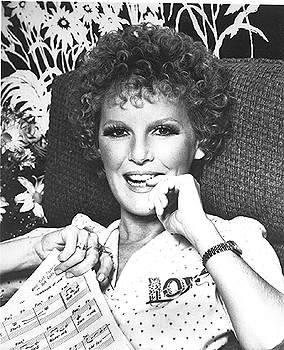
Vegas Visitor
March 5, 1975If music is your cup of entertainment tea, the Riviera offers 90 minutes of wide-ranging compositions sung in the distinctive styles of Petula Clark and the Stylistics. The vivacious British star, whose name is synonymous with such hits as "Downtown" and "Don't Sleep in the Subway," shares the headliner spot with the peripatetic Stylistics. The latter have twelve gold records to their credit, including some of the biggest sellers of the past decade.
Petula's is the more versatile of the two acts. Accompanied by the award-winning Dick Palombi orchestra, an aggregation of near symphonic proportions, she blends such contemporary songs as "Fire and Rain" and "I Got a Name" with a delicious medley of Cole Porter tunes highlighted by "It's De-lovely." The latter, which Porter introduced 40 years ago in a Broadway musical called Red, Hot and Blue, was a show-stopper sung by a promising young comedian named Bob Hope. It earned him a ticket to Hollywood.
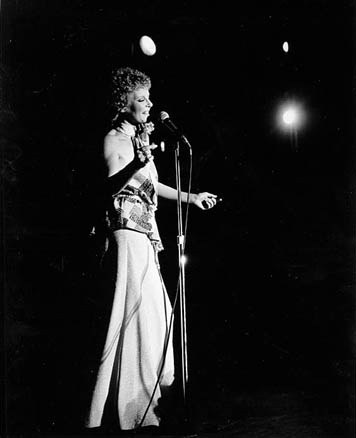
Petula
Live at the Riviera
August 7 - 20, 1975
 August 13, 1975
August 13, 1975
Petula Clark, always such a big favorite in her American appearances, has maintained her popular standing, in part, because of her continuing effort to change, broaden, adapt and surprise with her nightery shows. More sparkling and vivacious in person than any of her TV or film appearances have captured, Clark is at the Riviera with still another "new" Petula. Special guest stars the Righteous Brothers have reunited and have quickly caught up to where they were a few years ago before their split.
By herself, Petula, is always a musical treat. The "Downtown" lady is an uptown entertainer with a varied musical repertoire. Add the distinctive creative touches of notables~like Allan Carr, Marvin Hamlisch, Billy Barnes, etc., and Petula is embarking on an entirely new phase of her relatively unsung talents.
Her new review could very well be subtitled "Why Not Petula?"* - as in the special material number written by Barnes with his usual flair for showbiz wit and irony, and packaged by producers Carr and Claude Wolff. Petula's first Las Vegas production show is a sheer delight; she breezes through songs, dances, comedy bits and vigorous production numbers with the ease and charm of the veteran vaudevillian (that she is on the other side of the pond).
"Why Not Petula?"* sets the theme for why singers have gone into production sequences, and what "images" other ladies have cast for themselves. Petula's "Striptease" shows off a bit of leg, a bare shoulder, and an enommously likable gift for comedy. Backed by a male quartet of singers-dancers called "Friends" (Jeff Holland, Jerry Evans, Kim Michaels and Larry Coles), Petula dons baggy pants and top hat to kick off a London music hall revue that is the highlight of her show. It's a multi-sequence number with several costume, mood and musical changes for Pet and her boys.
Choreographer Steve Merritt has captured a right flavor and lively tempo that is a perfect compliment to the star's versatility. Clark's drolly underplayed humor blends neatly with the scamper-banter doings. A final production number is from The Wiz with Petula wearing the Ruby Reds with lion, tin man and scarecrow associates for "Ease on Down the Road." Scattered throughout the show are songs like "You and I," "This Is My Song," "Too Shy to Say," etc., and, of course, a Clark standard, "I Don't Know How to Love Him," and several of her hit tunes. Frank Owens is musical conductor with the Dick Palombi orchestra; special musical arrangements are by Roy Rogosin and Darnell Pershing; gowns and costumes by Nolan Miller.
 August 20, 1975
August 20, 1975
Petula Clark and the Righteous Brothers are a winning combination onstage and at the box office, and their current run at the Riviera could prove one of the highlights of the season. While the Righteous boys continue to accent rock -n- roll tunes which jetted them to stardom a decade ago, it's an entirely new and totally refreshing Clark this time around. Frank Owens batons the Dick Palombi orchestra for Clark.
Producers Allan Carr and Claude Wolff have surrounded the British star with a superb quartet of singers-dancers billed as Friends. They (Larry Coles, Jeff Holland, Jerry Evans, Tim Michaels) turn that segment of the show into a delightful mini-musical which is a page out of London music hall entertainment.
Departure from the demure, sophisticated British image is bound to work well for the Clark career. She is astonishingly versatile, a fact which the shy facade obliterated in years past when she was content to ride the crest of her record hits. Appreciative fablers rewarded her with a spontaneous and well-deserved standing ovation.
 September 6, 1975
September 6, 1975Fresh with four fantastic dancers and smashing musical production numbers, British song-star Petula Clark spotlighted her diverse talents in an all-new cabaret show ready to hit major nightclubs nationally. The ABC recording artist won the standing-room-only August 19 audience as she easily moved from her million-selling English hits of the mid-1960s to motion picture melodies and Broadway showstoppers.
Petula romped, dazzled and just plain outperformed her way through the fast-paced hour show, beginning with Leslie Bricusse songs from Goodbye Mr. Chips, which included the haunting "You and I" and a London music hall medley. She nearly stopped the show with a moving rendition of "I Don't Know How to Love Him," and served up a strong "This Is My Song," written by Charlie Chaplin for The Countess from Hong Kong. A jazzed-up, soul-rock "Downtown" followed "I Know a Place" and "Don't Sleep in the Subway" in her English hit medley.
Conductor-arranger Frank Owens, with Petula for ten years, paced the show through twelve super songs, which included a salute to the Beatles featuring the dancing and singing of Larry Coles, Jerry Evans, Jeff Holland and Tim Michaels. Billy Barnes' "Why Not Petula?" just may end up as Miss Clark's "Petula with a P." She sang the love song from the current Broadway smash hit A Chorus Line by Marvin Hamlisch, entitled "What I Did for Love." In her clear, strong voice she frolicked on the Yellow Brick Road in "Ease on Down the Road" from the black musical The Wiz.
In her third engagement for the Riviera, Petula has outgrown her "girlish" image and reached her deserving stardom as an international lady of song and entertainment.
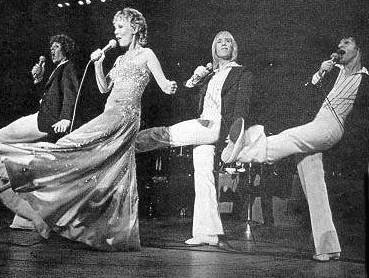
Petula with three of her four "Friends"
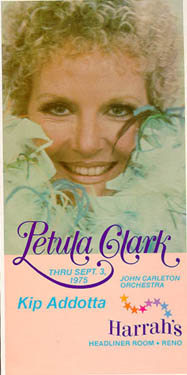
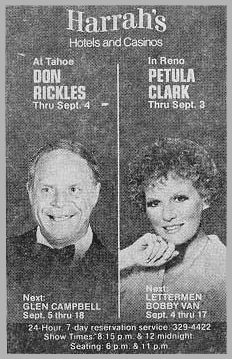
SONG LIST
- You and I (begun off-stage)
- Don't Sleep in the Subway/I Know a Place/ Downtown medley
- What I Did for Love
- I've Got a Name
- Why Not Petula? (specialty song lyrics)
- This is My Song
- English Music Hall Medley (Performed with Friends)
- You'll Never Know
- Beatles medley:
(Eleanor Rigby-performed by Friends)
(Hard Days Night/With a Little Help from my Friends/When I'm Sixty-four/ Yesterday/ London is London) - Too Shy to Say
- Fire and Rain
- I Don't Know How to Love Him
- Ease on Down the Road (from The Wiz)
Petula Clark and "Friends" receiving the Waldorf Astoria Oscar.
This award was presented to Petula for having broken the Empire Room's all-time attendance record.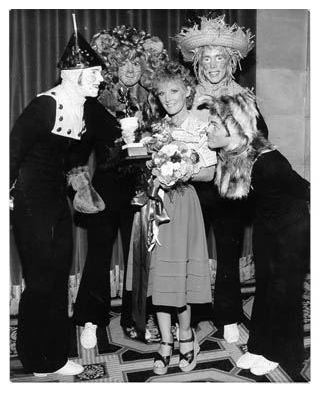
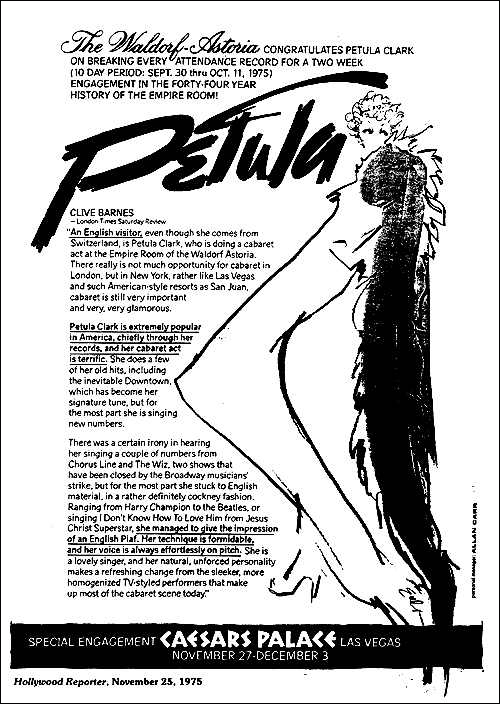
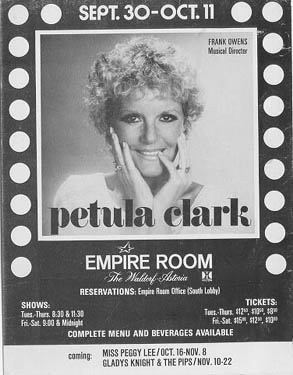
 August 28, 1975
August 28, 1975Petula Clark, brightly packaged, has accepted good advice, changed her nitery approach, and blossoms better than ever. Dispensing with her big hits immediately, she spends the first portion of the show solo, doing welcome numbers like A Chorus Line's "What I Did for Love" and Jim Croce's "I've Got a Name." Then, after talking of her "pert and perky" image, she musically decides "It's not enough just to sing," one must do everything, so "Why Not Petula?" This well-written specialty number, arranged with much brass distinctive of most songs here, intros "Friends," four fine dancers who later help make a music hall round, "Eleanor Rigby" and "Ease on Down the Road" memorable.
Clark herself both plays on British background and mocks it, with tributes to London, memories of music shared in war air raid shelters, and determination to be all demure and proper. Her "Burlington Bertie" is excellent and her "I Don't Know How to Love Him" superior. Trio of femmes accent vocally and Harold Wheeler conducts the supplemented John Carleton crew.
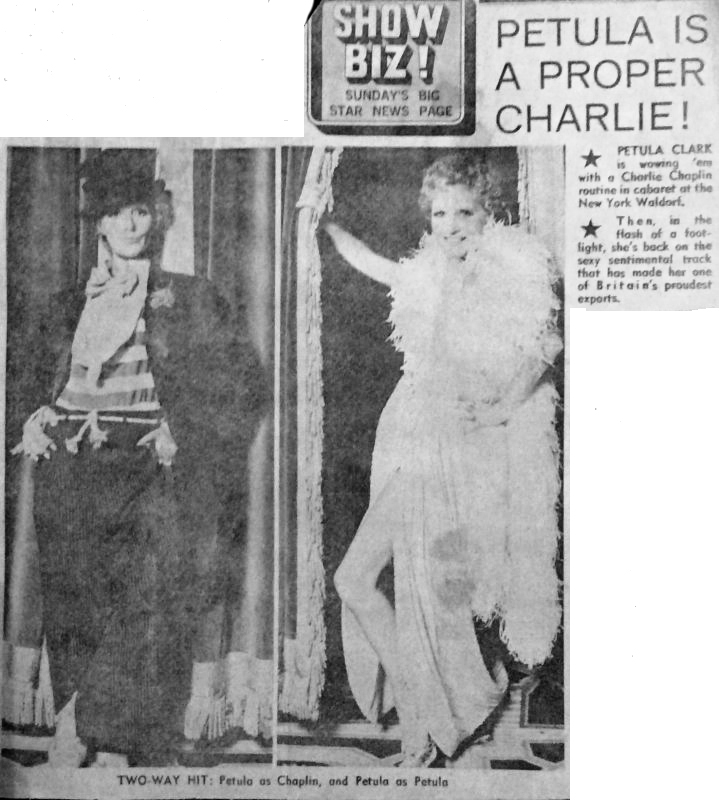
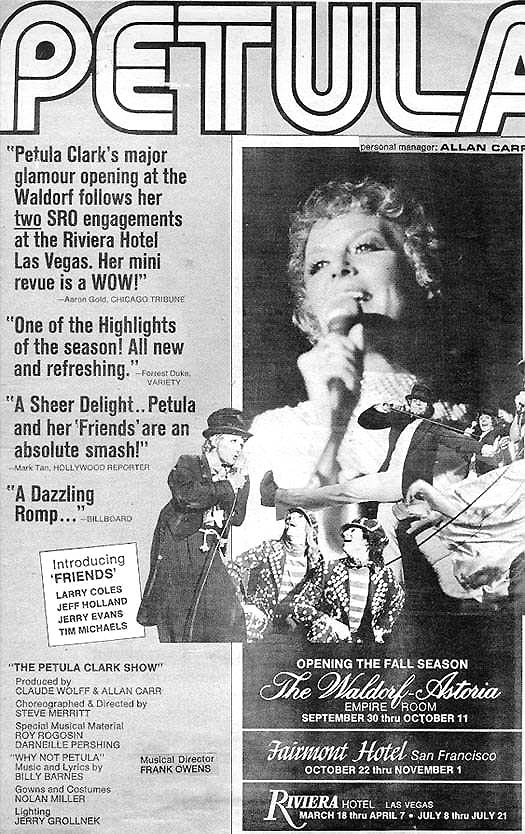
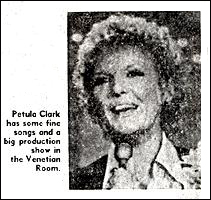
 October 28, 1975
October 28, 1975Petula's elegant show at the Fairmont
British singer Petula Clark's show at the Fairmont is one of the best to have played the Venetian Room. Ms. Clark is also among the most charismatic and effective singers to have worked that famed supper club.
The production, which sometimes has 34 artists participating, is mounted by Ms. Clark's staff of orchestral and vocal superfluities, dancers, fancy lighting and extraneous material.
But Ms Clark, just when it seemed she was losing control, roared back on mike or emerged in another costume and regained her spotlight. She looks thinner than in her pop-rock starring days of the 1960s--a bit like Mary Martin--and she has magnificent command of not only her voice but of the best skills of the British music hall. Three young ladies do back-up singing ("The Honey") and four singing-dancing-tumbling young men (called "Friends") play out various roles with Ms. Clark. The production is tight, thoroughly theatrical and (with the exception of a couple of poor tune selections) a first-rate hour of musical show biz.
Dispensing, right away, with three of her 1960s gold records ("Downtown," "I Know a Place," "Don't Sleep in the Subway") Ms. Clark then greets her audience with some charming remarks and moves quickly into "What I Did for Love," from Marvin Hamlisch's score for "A Chorus Line". . . the four "Friends", in sparkling costumes, sang and danced about her.
Ms. Clark's voice was straining on the show we saw, [Editor's note: She was suffering from the flu.] but full, still, of the gritty music hall tradition. Her song, dance, mime and comedy routines, done in a delightful clown-tramp costume (Chaplin lives!) were exquisite. "Friends" in puffy caps, rugby shirts and all, bounced around during the long medley of faves like "Birmingham Berie" and "Where Did You Get that Hat?"
She dropped in a tender World War II reminder with "You'll Never Know" (Gracie Fields lives!) then knocked off four Beatles numbers including "When I'm Sixty-Four" and a feature by Friends (considerably exaggerated) on "Eleanor Rigby."
Charles Chaplin's "This is My Song," which Ms. Clark made a hit record in 1967, was gorgeously sung and James Taylor's warhorse, "Fire and Rain," got the best rendition I"ve ever heard of the tune. [Editor's note: Frank Owen's masterful arrangement.]
Pianist-conductor Frank Owens, supervising 25 instrumentalists had things well under control in a most elegant way.
In fact, that's the word--the show is elegant and entertaining, fascinating, musical and professional. But, it is a show, and the songs sometimes suffer in the settings.
Philip Elwood
San Francisco Examiner
British singer Petula Clark's show at the Fairmont is one of the best to have played the Venetian Room. Ms. Clark is also among the most charismatic and effective singers to have worked that famed supper club.
The production, which sometimes has 34 artists participating, is mounted by Ms. Clark's staff of orchestral and vocal superfluities, dancers, fancy lighting and extraneous material.
But Ms Clark, just when it seemed she was losing control, roared back on mike or emerged in another costume and regained her spotlight. She looks thinner than in her pop-rock starring days of the 1960s--a bit like Mary Martin--and she has magnificent command of not only her voice but of the best skills of the British music hall. Three young ladies do back-up singing ("The Honey") and four singing-dancing-tumbling young men (called "Friends") play out various roles with Ms. Clark. The production is tight, thoroughly theatrical and (with the exception of a couple of poor tune selections) a first-rate hour of musical show biz.
Dispensing, right away, with three of her 1960s gold records ("Downtown," "I Know a Place," "Don't Sleep in the Subway") Ms. Clark then greets her audience with some charming remarks and moves quickly into "What I Did for Love," from Marvin Hamlisch's score for "A Chorus Line". . . the four "Friends", in sparkling costumes, sang and danced about her.
Ms. Clark's voice was straining on the show we saw, [Editor's note: She was suffering from the flu.] but full, still, of the gritty music hall tradition. Her song, dance, mime and comedy routines, done in a delightful clown-tramp costume (Chaplin lives!) were exquisite. "Friends" in puffy caps, rugby shirts and all, bounced around during the long medley of faves like "Birmingham Berie" and "Where Did You Get that Hat?"
She dropped in a tender World War II reminder with "You'll Never Know" (Gracie Fields lives!) then knocked off four Beatles numbers including "When I'm Sixty-Four" and a feature by Friends (considerably exaggerated) on "Eleanor Rigby."
Charles Chaplin's "This is My Song," which Ms. Clark made a hit record in 1967, was gorgeously sung and James Taylor's warhorse, "Fire and Rain," got the best rendition I"ve ever heard of the tune. [Editor's note: Frank Owen's masterful arrangement.]
Pianist-conductor Frank Owens, supervising 25 instrumentalists had things well under control in a most elegant way.
In fact, that's the word--the show is elegant and entertaining, fascinating, musical and professional. But, it is a show, and the songs sometimes suffer in the settings.
Philip Elwood
San Francisco Examiner
1976
 February 14, 1976
February 14, 1976Petula Clark sprung from England in the swinging 60s and soared to the top of pop music charts. "Downtown " "I Know a Place," "Don't Sleep in the Subway" - the hits came easy.
Now there's the curly-haired gamine in sequins, successfully connecting with crowds who don't know what to expect from her at the Fontainebleau's La Ronde Superstar Theater. Being an unknown quantity has its advantages in this intimate setting. Petula plays upon them in a show of distracting excellence, daring variety and uncomplicated charm.
So the elements haven't been sorted out properly yet; still, the lass delivers an act worthy of a television extravaganza. The one-dimensional Top 40 tune days are far behind her. What flowers on the stage is a scamp in baggy pants with a Chaplinesque sense of humor; a little girl lost dressed in gingham out of The Wiz, and a sophisticated cabaret singer who's not afraid to break new ground.
The real Petula Clark, then, defies simple classification. She covers up a winsome shyness with self-deprecating jokes, and launches into a number "Why Not Petula?" that justifies the many unexpected shifts in her act. Because everyone from bump-and-grinding Tom Jones to the unpretentious singer before us needs a gimmick, she has several in this Ann-Margret parody song - a neon name sign; a slinky, one-shoulder gown; and the obligatory jumpsuited male dancers.
The peculiar aspect of all this is that, once the number's over, she continues to rely on lots of productions. Weaker, less confident singers may need the full cabaret artillery to wow an audience; Petula Clark doesn't.
Quickly dispensing with her hits in a medley, she advances into dreamier, more contemporary material. The lullaby-soft voice turns insistent with a ferociously good interpretation of Jim Croce's "I've Got a Name," and you know the lady isn't going to limit herself. A jolly fine English music hall routine sees Petula in a tattered outfit worthy of The Tramp. A clean segue into a picture memory of Great Britain, when the singer was a child and songs like "You'll Never Know" were popular - and another, pensive side is revealed.
She has no problems doing a wild version of "Fire and Rain," letting loose with a mad yell; a jaunty Beatles tribute; or a highly charged, explosively dramatic "I Don't Know How to Love Him" from Jesus Christ Superstar.
But there's an imbalance, for all the ecstatic highs. As the singer later admits, she wanted to branch out from the staid go-out-and-sing-your-hits formula. OK, but we don't get enough of just Petula, surrounded as she is by lush orchestrations, three fine female singers, and Friends, the quarter of male singer-dancers. These four ex-athletes from San Jose, California are powerhouse entertainers who tend to overwhelm the tiny blonde Briton at center stage. Their driving, amiable eroticism, appealing though it is, shouldn't be competing with the subtle, demure star of the show.
This point is proved by the loveliest voicing of Stephen Sondheim's "Send in the Clowns" I've ever heard with Petula accompanied only by superb piano stylist Hugh Wheeler.
(Note: Petula's musical director was HAROLD Wheeler.)
May 28 - 31, 1976
Tamiment, New York USA
May 28 - 31, 1976
Tamiment, New York USA

 June 30, 1976
June 30, 1976This is Petula Clark's first Nugget date, her act perfect for the rather homespun clientele of the cordial Celebrity Room. It is packed with good vocals and a little production augmented by her four male "Friends." These dancers look so unlike the usual line, their immense talent is all the more pleasing. The disparate looks jell into a top-notch movement unit that fits in tight places around and behind standing mikes, and works with incredible polish. They do far more than just enhance.
The English music hall turn is wisely retained but would make a far better closer than the new "Baby Face," a fun routine with the boys as boys and Clark as a little girl obviously becoming more than that. It's good for the middle but a weak closer. Besides, such a move would move Friends' "Eleanor Rigby" to a well-deserved better spot.
Clark chats some, zinging the country's birthday, or rather the colonies' birthday. Don Conn, who surely remembers his orchestra backing Clark in the earlier stages of her career atop Harold's Club, turns over his orchestra to Harold Wheeler.
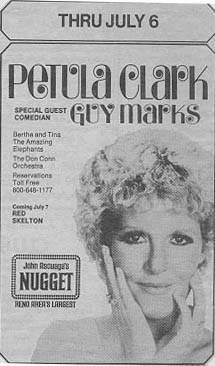

July 1, 1976
Sprightly Petula Clark, with her clear, precise voice, is a whale of an entertainer. She's bright and friendly and very professional and has put together a smooth show with plenty of variety.
Looking gorgeous in a sparkly purple gown, she opens with a medley of her hits, moving easily into such numbers as "This Is My Song."
A delightful and important part of her show is "Friends," a group of four very appealing young men who dance and harmonize either with her or to cover for her costume changes. They arrive first in the usual "pearly costumes" of the Cockneys, and she appears in a tattery pair of pants to do this portion with them. It's all very lively and gay and a great deal of fun. She handles some clever patter about accents which leads into a medley of love songs from the 1940s. There is a chumming Bicentennial nod, handled with absolute finesse.
Her musical director, Harold Wheeler, has a chance to show his fine playing as he accompanies her with the ever popular "Feelings," and it moves on to the excellent closing number, "Baby Face," with Petula and Friends in juvenile outfits.
Stand-up comic Guy Marks is an audience pleaser in the opening slot, particularly with his impressions.


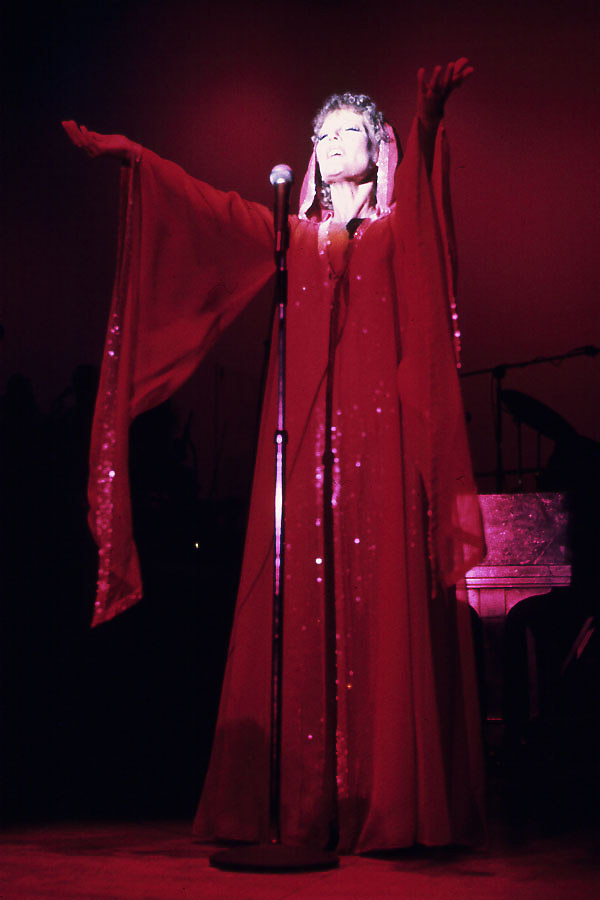
Don't Cry for Me, Argentina
All stage photos courtesy of Linda Rice
 July 19, 1976
July 19, 1976Joel Grey starts the evening with a reprise of his tried and proven nitery act, an act which never fails to impress with its theatrical flourishes and the apparently limitless versatility of its star.
Petula Clark quickly dispenses with her medley of well-known hits. Centerpiece of this Clark edition is a mini-musical tribute to Broadway and some of its best parts for leading ladies. Petula jumps in and out of costumes, character and songs in saluting the roles of Annie Oakley, Charity Valentine and Mary Magdalene. She's enchanting, enticing, witty and charming, in addition to having more obvious talents as a singer and dancer. Petula dances quite a bit in this show, including a surprise rendition of "Baby Face" disco-style and "I've Got the Music in Me."
Petula is accompanied, and most impressively at that, by her quarter of male singers-dancers called "Friends" -Larry Coles, Jeff Holland, Jerry Evans and Kim Michaels (It's Tim, actually.)-who also get to showcase their individual and collective talents. Allan Carr and Claude Wolff are Petula's producers. Harold Wheeler is m usical director and arranger. Steve Merritt rates special praise for his direction and choreography, and Bob Mackie (of course) whipped up the stunning wardrobe.
 July 21, 1976
July 21, 1976Petula Clark and Joel Grey team to give the Versailles Room a pleasant hunk of music, song and dance laced with levity.
Clark has worked Vegas enough to realize she thinks it's a terrible place (polite applause), but after she gets that speech off her chest she plunges into her usual entertaining turn which might even make most locals forgive her. (Another European expatriate, Marcel Legrand, now at the Sahara, also tells of his dislike of Vegas, but he's not quite so vehement as Clark, possibly because this is his first visit.)
Friends quarter (Lany Coles, Jeff Holland, Jerry Evans, Tim Michaels) are ideal stagemates for Clark with their top-drawer singing and dancing. Three unbilled femme singers contribute neat blends to the Clark tones. She does costume changes for her Annie Get Your Gun, Sweet Charity, Jesus Christ Superstar and "Baby Face" salutes, all to good effect. Steve Merritt's choreography is imaginative, and Harold Wheeler's conducting of the Dick Palombi orchestra is smooth.
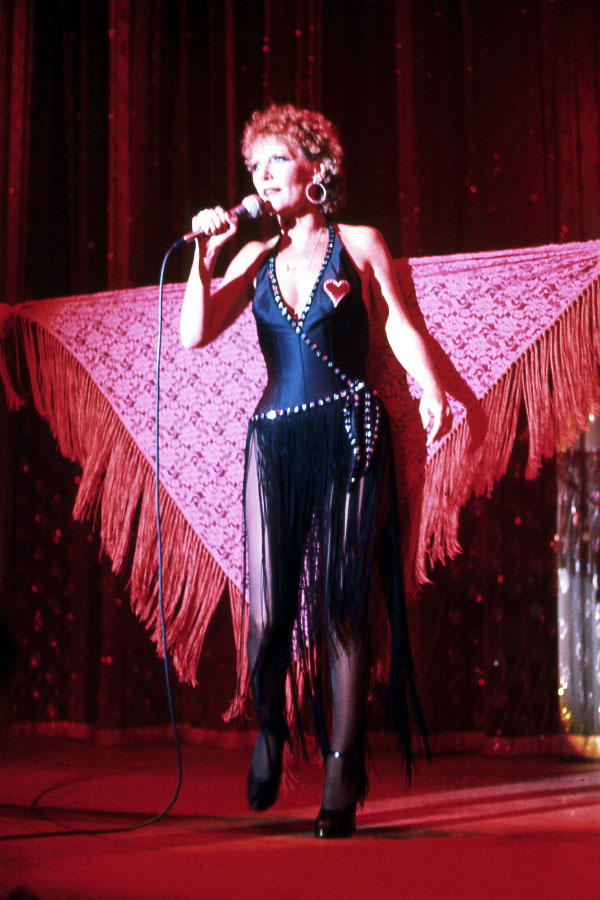
Sweet Charity
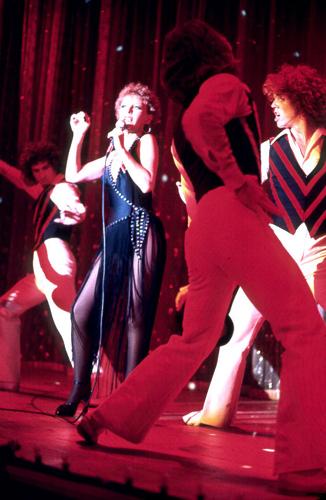
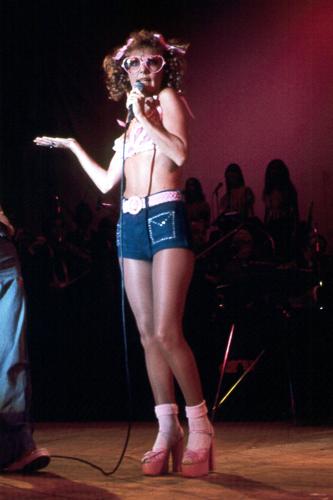
Baby Face
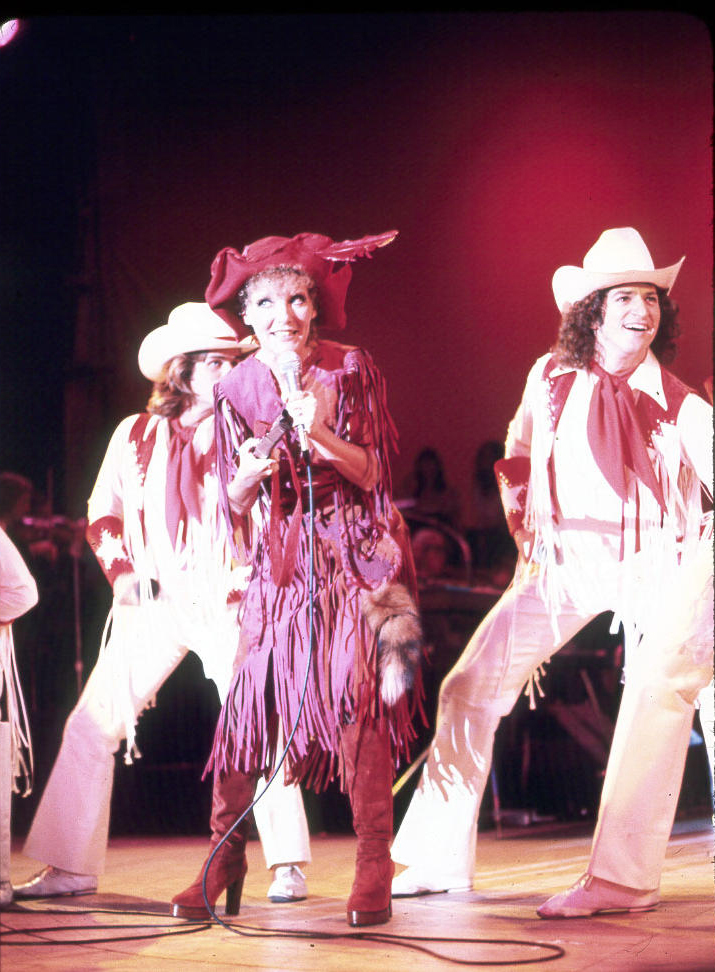
Annie Get Your Gun
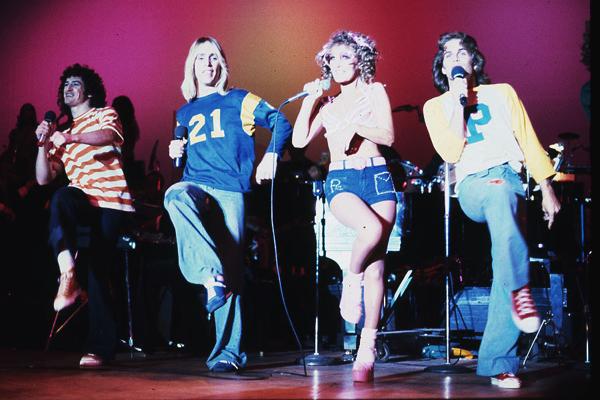
Larry, Jeff, Petula, & Tim

Annie Oakley
"Ya cain't git a man with a gun."
 October 6, 1976
October 6, 1976The Waldorf's Empire Room, which opened with Britain's Petula Clark, is expected to have standup business during her engagement. She has come in with basically the same type turn as before, which is a heavily populated company with four boy dancers, three girl singers and a number of key musicians. She has learned to use this setup effectively so that she can emerge through all these foreign entanglements and register on her own. The extras enable her to catch her breath, change costumes and assess the situation out front.
Clark as a cafe attraction is considerably more stable than the pound. She has an engaging sound and a personable mien. Her catalog is well constructed, with only brief references to the tunes she popularized. Her big numbers medley from Broadway musicals adds to her stature, and an assortment of tunes from the standard and contemporary orbits gives her a wide range and variety. She has a lot of good movement in her act on her own. The boys are good dancers who, according to Clark, will go their own way at the end of this engagement to work at Reno Sweeney's. They are a lively group who work well with Clark in the production intervals. The three femme singers provide further vocal texture to the act.
Clark is alone onstage toward the end of the turn. Thus the excellent hand she received for her efforts is virtually earned as a solo performer. Her musical director is Harold Wheeler, who conducts the Deny Kravat orchestra authoritatively.
The Big Apple acquired an extra high-gloss shine Tuesday night with the opening of Petula Clark's great new show at the Empire Room of the Waldorf-Astoria. It was an electric evening. This was the first night of the Empire Room's new fall season, which promises acts that have proven their drawing power there in the past, including Miss Peggy Lee, Chita Rivera and Blood, Sweat and Tears. It was also a return visit for Miss Clark, who laid siege on our radios in the Sixties with hits like "Downtown" and "I Know a Place." Those early hits are in Miss Clark's show, but she gets these out of the way quickly and moves on to new territory, singing several up-to-the-minute songs and concluding with a most compelling interpretation of Chuck Manglone's "The Land of Make-Believe." She also does a medley of Broadway tunes from Annie Get Your Gun, Sweet Charity and Jesus Christ Superstar, and she manages to make each sound freshly minted. Appearing with Miss Clark is an attractive and very agile group called Friends, four young men led by blond-tressed Jeff Holland. They fill the brief spaces during Miss Clark's costume changes without letting the show sag for a minute, and they constitute a real plus. There is also a backup chorus of three women.
Miss Clark has acquired a gifted musical director, Harold Wheeler (who did the orchestrations for the Broadway musical The Wiz,) and she has brought along her own socko rhythm section. Her dazzling costumes (she's got 21 of them for the run of the show) were designed by Bob Mackie.
Petula Clark will be at the Empire Room, with two shows nightly except Sundays, until October 9. It is a splendid hour-plus of entertainment that doesn't let up until Miss Clark takes her final bow. Catch it if you can.
Source unknown
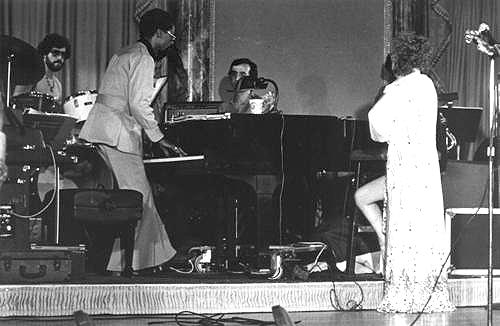
Petula and Music Director Harold Wheeler in rehearsal
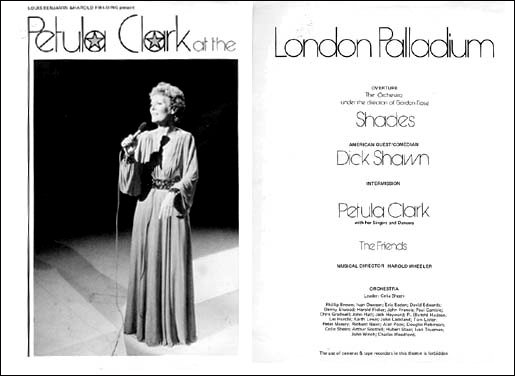
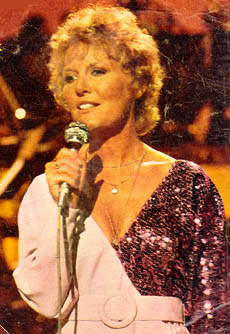
 Tuesday, November 9 1976
Tuesday, November 9 1976Pet is still an English rose at heart
Returning to the West End stage for the first time in 15 years, Petula seems anxious to prove that while London gave the world the girl, France and America have given us back a woman.
In Britain for the past two decades she has had to carry the image of little Pet, the local girl who made good. Now she wants to be seen to have grown up.
She comes out looking her sexiest in a gown with slit skirt and plunging neckline, and starts discussing her bust- "No sympathy please, a small thing but my own. There's no silicone in this act."
Then she goes into a Broadway musicals routine singing as Annie Oakley, the Sweet Charity floozie, and Mary Magdalene in Jesus Christ Superstar.
Dramatic
Her dynamic interpretation "I Don't Know How to Love Him" wins the loudest applause of the night. Most of her music is contemporary, upbeat and backed by four boy dancers and three girl singers, you can almost feel her emphasizing that this is a sophisticated lady returning home.
She receives a fine ovation at the end of her show and even does an extra number sitting on the stage.
Yet with a name like Petula and her slight, elfin figure, she still appears a young girl and presumably always will.
And like our other English rose, Julie Andrews, she stays obstinately Petula Clark from Surrey - no matter what the tempo, her costume, or the international veneer.
She has a beautifully lit and well-produced show, and with the intention of burying the past gets rid of her record hits at the start of the show.
Comedian Dick Shawn, who plays most of the first half, must be wondering if his journey was really necessary and how to change his material. Laugh? He thought they would never start.
In Britain for the past two decades she has had to carry the image of little Pet, the local girl who made good. Now she wants to be seen to have grown up.
She comes out looking her sexiest in a gown with slit skirt and plunging neckline, and starts discussing her bust- "No sympathy please, a small thing but my own. There's no silicone in this act."
Then she goes into a Broadway musicals routine singing as Annie Oakley, the Sweet Charity floozie, and Mary Magdalene in Jesus Christ Superstar.
Dramatic
Her dynamic interpretation "I Don't Know How to Love Him" wins the loudest applause of the night. Most of her music is contemporary, upbeat and backed by four boy dancers and three girl singers, you can almost feel her emphasizing that this is a sophisticated lady returning home.
She receives a fine ovation at the end of her show and even does an extra number sitting on the stage.
Yet with a name like Petula and her slight, elfin figure, she still appears a young girl and presumably always will.
And like our other English rose, Julie Andrews, she stays obstinately Petula Clark from Surrey - no matter what the tempo, her costume, or the international veneer.
She has a beautifully lit and well-produced show, and with the intention of burying the past gets rid of her record hits at the start of the show.
Comedian Dick Shawn, who plays most of the first half, must be wondering if his journey was really necessary and how to change his material. Laugh? He thought they would never start.
 The Big First Night
The Big First NightPet appeal wows the Palladium
PETULA CLARK may have acquired an elegant chic in her long exile across the Channel, but her return to the London Palladium proves that basically she is still as English as the rose, and occasionally quite as barbed.
Yet there is somthing dewily refreshing about her act. Who could resist a star who unloads her three biggest hits at the outset, and then goes on to tackle a medley of show-stoppers from shows stopped by such ladies as Ethel Merman and Shirley McLaine.
The effect is rather like an audition at this point. But on audience appeal I would give Miss Clark any part she asked for.
Subtlety
In a heady array of costume changes, each designed to show off her spectacularly trim Peter Pan figure, she parades a dangerous blend of sophisticated belting offset by a Roedean schoolgirl's sense of the ridiculous.
The voice does not surrender to raucous gimmicks, as once it did; instead she confidently decorates expected notes with wit and no small subtlety.
Had she been more hardheaded she would also have dispensed with the services of Dick Shawn and done the comedy spot herself, as she clearly could.

November 1976
The Palace
Manchester, UK
November 1976
The Palace
Manchester, UK
November 1976
Hippodrome
Birmingham, UK
November 1976
Hippodrome
Birmingham, UK
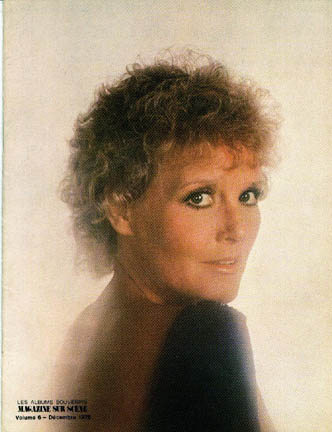
Programme
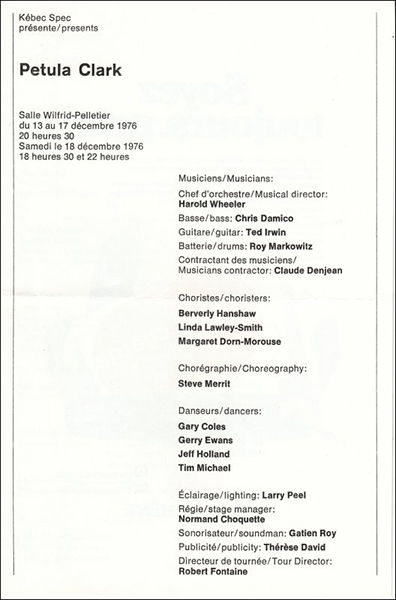
Song List
- Your Song
- Ma Fete a Moi
- Romeo/Marin/Chariot
- Beatles medley
(Something/ Eleanor Rigby/Penny Lane/All You Need is Love) - Je Voudrais qu'il Soit Malheureux
- La Gadoue/O O Sherrif/Les Incorruptibles
- Fire and Rain
- Coeur Blesse
- I Couldn't Live Without Your Love
- Un Enfant
- L'enfant Do
- Baby Face
- Que Fais-tu la, Petula?
- Don't Sleep in the Subway/I Know a Place/Downtown
- This is My Song
- (On Broadway/Blame it on the Nights of Broadway) Sung by Friends
- ANNIE GET YOUR GUN
(You Can't Get a Man With a Gun/The Girl that I Marry/ Romance is Wonderful) - SWEET CHARITY
(Hey Big Spender/Gonna Get Out/Where Am Going?) - JESUS CHRIST SUPERSTAR (Friends)
I Don't Know How to Love Him - La Vie En Rose
- Feelings
- Je Me Sens Bien (Apres De Toi)
- I Got the Music in Me
- Could it Be Magic
- Every Time I Say Goodbye (I Die a Little)
1977
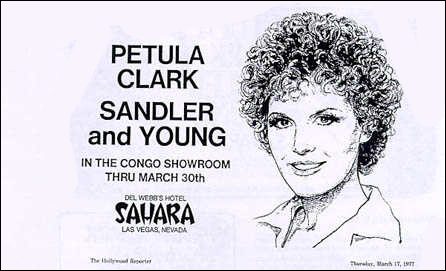
 March 24, 1977
March 24, 1977 A curious but not altogether unpalatable pairing of three new Sahara stars marks the debut appearance of both Petula Clark and Sandler & Young. In their co-starring bow, there's a helpful similarity in their audiences as well as a very marked difference in their styles, material and presentation.
One of the most engaging, charming and versatile of singing stars, Petula Clark's major production hunk is a tribute to some great Broadway lady roles: Annie Oakley, Mary Magdalene and Charity Valentine. A Clark medley of hits includes "Downtown," "This Is My Song," "Don't Sleep in the Subway," plus a nice selection of new and old songs from "My Melancholy Baby" to "Land of Make Believe." She's backed by a trio of male singers-dancers called Friends and a trio of femme singers; the former get to solo in several spots and do a fine job executing the stylish choreography of Steve Merritt. The Jack English orchestra backs the show, conducted by Harold Wheeler.
 March 30, 1977
March 30, 1977 There is a surfeit of music in this billing of Petula Clark and Sandler & Young, but enough contrast is shown within the two stylish acts to keep interest up for about 100 minutes. This is the first time for Clark and Sandler & Young at the Sahara, but all concerned win high marks with Congo Room audiences.
Clark's versatility in song and movement with her three male dancers springs from early English music hall years, one teaming in fact with Anthony Newley when they were both 15 or so. She displays unique wit in many instances when chatting about an upcoming song or merely passing the time of night with the payees.
Her best turn is the Broadway medley, designed as her tour de force, and it works with a stomping Annie Get Your Gun collection enforced by her dancing "Friends" and backed by an above average lady trio. The Sweet Charity sequence also holds peak interest, and in the finale of the medley, only her overwrought screaming on "I Don't Know How to Love Him" from Jesus Christ Superstar flaws the trilogy's impact.
Sandler & Young is a tough act to follow, but Clark manages to win her points before too long. Harold Wheeler conducted for Clark, Leo DeLyon for Sandler & Young, both from their piano perches.
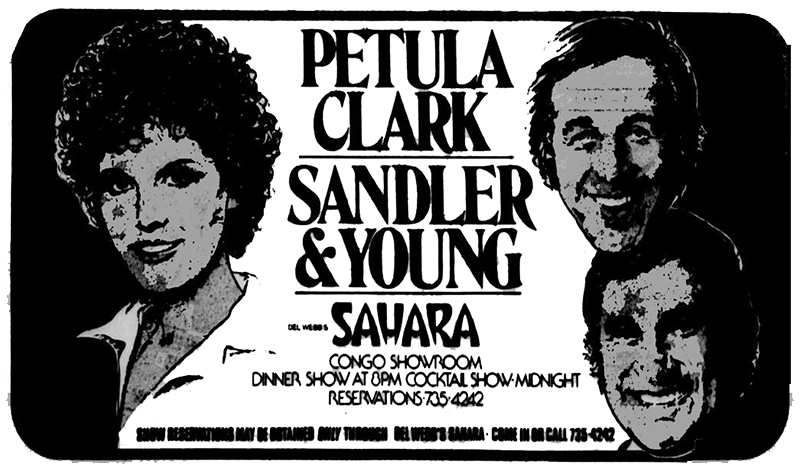
September 29 - Oct. 13, 1977
Sahara
Las Vegas, Nevada, USA
September 29 - Oct. 13, 1977
Sahara
Las Vegas, Nevada, USA
1977
Hilton Hotel
London, UK
Private engagement for Datsun.
1977
Hilton Hotel
London, UK
Private engagement for Datsun.
1978
London Palladium
London, UK
In the presense of Princess Margaret, a Golden Anniversary gala concert organized to commemorate the 50th anniversary of female suffrage.
Stars in attendance: Petula Clark, Georgia Brown,
Stephanie Lawrence,
The Beverley Sisters,
Anita Harris,
Marion Montgomery,
The Love Machine,
Mary O'Hara,
Twiggy,
Felicity Kendal,
Lorna Dallas
London Palladium
London, UK
In the presense of Princess Margaret, a Golden Anniversary gala concert organized to commemorate the 50th anniversary of female suffrage. Stars in attendance: Petula Clark, Georgia Brown, Stephanie Lawrence, The Beverley Sisters, Anita Harris, Marion Montgomery, The Love Machine, Mary O'Hara, Twiggy, Felicity Kendal, Lorna Dallas
1979
4 -7 July, 1979
Hilton Hotel
Bahrain
4 -7 July, 1979
Hilton Hotel
Bahrain
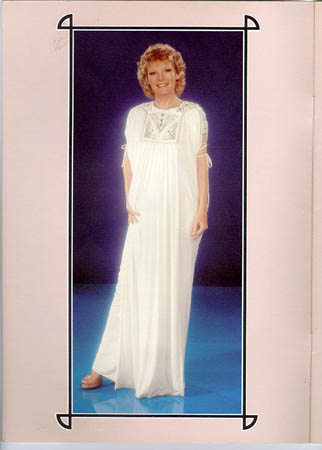
Songs performed
- With a Little Luck
- Don't Sleep in the Subway
- Something vElton John Medley
- You and I
- I Know a Place
- On With the Show
- La Vie en Rose
- Beat Out Dat Rhythm on a Drum
- I Don't Know How to Love Him
- Fire and Rain
- Too Shy
- God Bless the Child
- Un Enfant
- Day and Night
- The Other Man's Grass is Always Greener
- This is My Song
- I Got the Music in Me
- Could It Be Magic
- Where is Love?
- Pinball Wizard
- Don't Cry for Me, Argentina
- My Love
- Downtown Encores
- Fill the World with Love
- The Way We Were I Couldn't Live Without Your Love
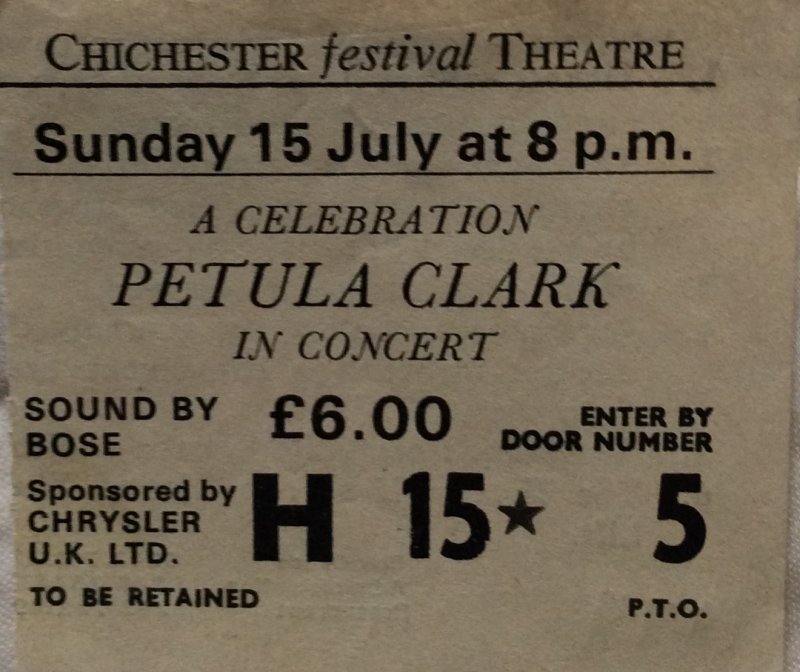

SONG LIST
Don't Sleep in the Subway
Que fait-tu la Petula?
Elton John medley
C'est ma chanson
I Couldn't Live Without Your Love
Un enfant
Sauve moi
You and I
I've Got the Msic in Me
Romeo/Marin/Chariot
Could it Be Magic
Don't Cry for me Argentina (Chanson d'Evita?)
My Love /Downtown
Coeur Blesse
[Courtesy of Steven Warner)
Don't Sleep in the Subway
Que fait-tu la Petula?
Elton John medley
C'est ma chanson
I Couldn't Live Without Your Love
Un enfant
Sauve moi
You and I
I've Got the Msic in Me
Romeo/Marin/Chariot
Could it Be Magic
Don't Cry for me Argentina (Chanson d'Evita?)
My Love /Downtown
Coeur Blesse
[Courtesy of Steven Warner)
17 October, 1979
Deavenport Theatre
Stockport, England, UK
17 October, 1979
Deavenport Theatre
Stockport, England, UK
18 October 1979
Spa Royal Hall
Bridlington, England UK
18 October 1979
Spa Royal Hall
Bridlington, England UK
19 October, 1979
De Montfort Hall
Leicester, England UK
All The Hits And More concert
19 October, 1979
De Montfort Hall
Leicester, England UK
All The Hits And More concert
20 October, 1979
Southport Theatre, England UK
20 October, 1979
Southport Theatre, England UK
8 December, 1979
Jollees Theatre
Stoke-on-Trent, England UK
Opening Act: Johnny More
8 December, 1979
Jollees Theatre
Stoke-on-Trent, England UK
Opening Act: Johnny More
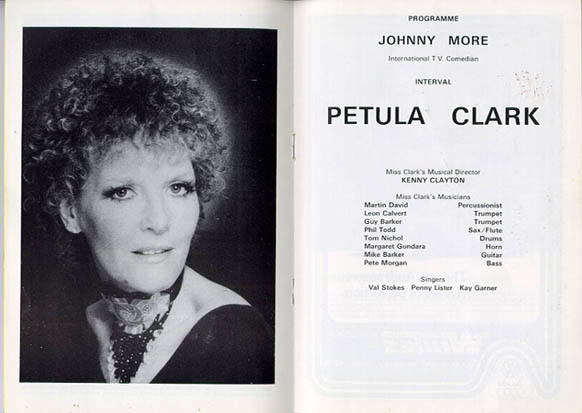
Songs performed
- With a Little Luck
- Don't Sleep in the Subway
- So Sad / Elton John Medley
- This is My Song
- I Couldn't Live Without Your Love
- I Got the Music in Me
- Could It Be Magic
- Where is Love? (from Oliver)
- Pinball Wizard (from Tommy)
- Don't Cry for Me, Argentina (from Evita)
- My Love
- Downtown
- I Don't Know How to Love Him
- La Vie en Rose
- Beat Out That Rhythm On a Drum (from Carmen Jones)
